When a small group of UW alumni launched this magazine in June 1908, little did they know that their publication would mirror much of the American experience in the 20th century. Its pages speak not only of Husky Stadium or the "Quad," but of a World War I gas attack, the Summer of Love on "Hippie Hill," McCarthy-style hearings and the day the Nazis marched into Paris. The voices of Ernest Hemingway, Sarah Bernhardt, Charles Johnson, John F. Kennedy, Don James, Henry Suzzallo, Betty McDonald—and thousands of everyday alumni—fill its volumes. In honor of its 90th birthday, Columns presents this special Web edition of the article highlighting its first 90 years.
1908-1919
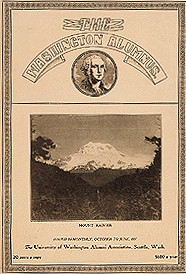 What is the Matter with Washington Athletics?
What is the Matter with Washington Athletics?
“We believe that the athlete desires to receive too much credit and attention. … It should not be necessary to heroize a man in order to secure hard work from him. It should not be necessary to encourage him with a crowd on the bleachers. … There is no more reason for catering to a student on account of his broad jump than on account of his broad smile. Nothing could be more truly said than that we lack a proper sense of relative values.” Editorial, First Issue, June 1908
The Needs of the Women in the University
“The environments of our women must tend to culture and refinement. They need place and opportunity for the cultivation of the aesthetic. They need better facilities for music, for art., for social intercourse with the cultured women of the city. … There should be literary, art and musical clubs, centers around with those of congenial tastes might gather.” Anna Howard, Dean of Women, June 1908
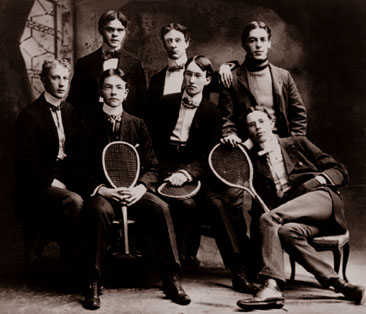
Fraternities and athletic clubs like the UW Men’s Tennis Club drew the ire of Law School Dean John T. Condon. Photo courtesy of UW Libraries Special Collections
What is the Matter with Washington?
“What is the matter with Washington? Too much society. Too many social stunts. Too many young men and women wasting time and energy in “queening.” Too much competition among the sororities and fraternities as to which can give the swellest and biggest social affair; and too much energy wasted in giving them.” Law School Dean John T. Condon, June 1908
The AYP Puts the UW on the Map
“The primary object of the AYP Exposition is to exploit the resources of Alaska and Yukon and to make known the vast importance of the trade of the Pacific Ocean and the countries bordering upon it. … Not only will the University’s location, its beautiful campus and the grandeur of its surrounding attract universal attention, but the college, as an institution, will acquire a prominence among Eastern people, which no other method, save this of personal contact, could achieve.” Minnizelle George, June 1908
Calling All Alumni Activists
“The time has come when the alumni should take an active part in the conduct of the University and they should be increasingly influential in securing appropriations for the Legislature and proper recognition from every source. … Though these columns the alumni will be kept informed of the developments at the University, both as a matter of interest to them and in order that they may make known to prospective students and friends the conditions and opportunities existing at the present time.” June 1908
Sex Segregation in Classes
“In the University there has been observed recently a slight tendency toward segregation of the sexes … We would like to speak out against the adoption of the segregation system at the University of Washington before the tendency becomes so marked that to denounce it might sound like treason…. Suppose a woman student should elect to study law, chemical engineering, architecture, draughtsmanship, higher mathematics or political science; and no other woman in the school that year should happen to [enroll]. It would simply mean that the woman or women in question would be denied their rightful educational opportunities. Some might say that the few women discriminated against in this way would be of little consequence in the long run, and that their vagrant energies would be simply steered away from improper channels of expression into the pursuit of more womanly activities. Yes—here would be one more subtle device for keeping women’s lives nicely within the well-worn grooves in which they have revolved, lo! these many years.” Rose Glass, January 1909
Legacy of AYP—Buildings and ‘Junk’
“The AYP Exposition will leave the University a half dozen of the finest buildings in the Northwest, but it will also leave a campus dotted with scores of boomtown shacks, filled with cosmopolitan junk, most of which will be offered to the University with variegated conditions as to adaptation.” May 1909
Seattle Chinese: Pioneer Builders of the Northwest
“It has been more than half a century since the first Chinese set foot on Washington soil. In those early days the Chinese were principally engaged in unskilled labor, such as laborers in railroad section gangs, mill hands, etc. With this as a nucleus, the population increased to several hundred, and among them were men with intellectual ability and foresight. … The Chinese population of the City of Seattle can truthfully be classified as among the pioneer builders of this great Pacific Northwest. Many large business blocks located on the principal streets are owned by some of the pioneer Chinese merchants, who were then shrewd enough to realize the future value of Seattle real estate.”—Lew Geate Kay, ’09, the first Chinese-American to graduate from the UW. Feb. 1910.
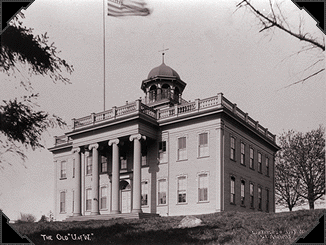
The original Territorial University Building located in downtown Seattle where the Olympic Hotel currently stands. Photo courtesy of Special Collections.
The Passing of a Landmark
“The old university building in the city is to be demolished. … It would cost about $10,00 to take the building apart and reconstruct it of the same materials on the new campus. President Kane and some of the enthusiastic old graduates were anxious to have this done. Donald MacDonald, of the committee of alumni, sent out an appeal in all directions. The meager results in the way of financial help demonstrated the fact that in this vigorous new community the people are much more interested in the work and problems of the present day than they are in fostering a sentiment of regard for an old historic building.” April 1910
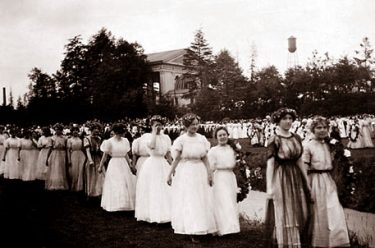
Social occasions like this 1913 “May Fete” drew the ire of one UW alumna. Photo courtesy of UW Libraries Special Collections
It is a Day of Many Frills
“College life at Washington is not what it was a few generations ago. … Where formerly one man taught several subjects now one subject is taught by several men. … The young people who were content to confine their social pleasures to the president’s annual reception and a few church socials have gone, and in their place is a breeze of blasé students with a host of dinner and dance engagements. The simple order of things has passed away and it is a day of many ‘frills.’ ” Helen M. Ross, April 1910
Rampant Commercialism Ruining Academia
“A resolution will be offered at the annual [alumni] meeting asking the association to go on record as opposed to intercollegiate contests with institutions outside of the states of Washington, Idaho and Oregon. … The resolution is good as far as its goes. But why not strike at the root of the matter—why not resolve against the commercialism which is rampant in not only the undergraduate’s athletics, but which is spreading into every line of these activities as well? Everything is measured today in gate receipts. There is scarcely a function during the college year, in which the question, “How much can we make?” does not enter. … Few activities are carried on for pure love of doing. It is come to such a pass that the student who is willing to do something for nothing is regarded with suspicion. … This state of affairs is a result of the athletic policy of the American university today. The football coach is paid more money for three months’ work than a dean gets for the year.” Editorial, May 1910
Woodrow Wilson Warns of Dependence on the Wealthy
“The colleges of this country are in … danger. They are looking to the support of the classes, looking to the support of wealth; they are not looking to the service of the people at large. … The universities would make men forget their common origins, forget their universal sympathies, and join a class—and no class ever can serve America. The great voice of America does not come from the seats of learning. … I know that the colleges of this country must be reconstructed from top to bottom, and I know that America is going to demand it.”—Woodrow Wilson, then president of Princeton University, June 1910.
Protecting UW Property from Land Speculators
“Two or three times within the last five years attempts have been made by individual members of the Board of Regents to get favorable consideration of the sale of the lower part of the University campus. Without discussing the past, I believe the alumni ought to be definitely on record as opposed to any plan for reducing the size of the University campus. The campus in time will all be needed for University uses and, in any event, as the city crowds upon us, we should have the full space of the campus to secure us against the encroachment of business.”—President Thomas Kane, June 1910.
The Fraternities Are Here to Stay
“There is neither time nor inclination to go into the different arguments for and against the college fraternity. Suffice it to say that the various legislatures are tilting at windmills, and had better be debating on the aesthetic and utilitarian advantages of pie for breakfast. Fraternities are no longer amusements, they are institutions. … The fraternity in some form or other will prevail as long as men and women in every activity of life seek out congenial associates.” October 1910
Sex Segregation Revisited
“Girls do not like to go into classes in which they are outnumbered four or five to one by the men and the same feeling prevails among the men. … In the department of English Literature, the classes have been segregated this year with gratifying results. … These was at first some feeling among the women that in this segregation they were being discriminated against and an apprehension that the men would be taught by professors and that the girls’ classes would be conducted by instructors, but such is not the case. The sentiment of both men and women now seems heartily favorable to the plan. … This method of segregation is being widely considered by nearly all the universities and colleges throughout the country.” October, 1910
Winning the Vote for Women in Washington
“The privilege of the ballot has been gained for woman in this state by the organized efforts of college women. … Miss Adella M. Parker, as president of the College Women’s Equal Suffrage league, made her efforts wide felt and effectual. … ‘Women vote in Idaho, Colorado, Wyoming, Utah, Australia, New Zealand, Norway and Finland. Are the women of Washington any less able to do so?’ was the argument she successfully pressed home to her listeners.” November 1910
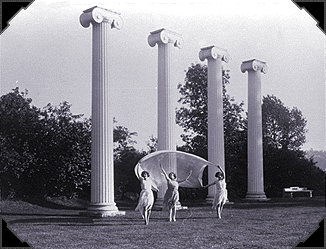
The four columns saved from the original university building in a 1920 photograph. Photo courtesy Special Collections.
Saving the Columns from the Wrecker
Although loyal alumni and friends of the University tried by every means in their power to save it, the old building and Fourth and University, known as the Cradle of Greater Washington, has been torn down and the site utilized for new improvements. … The alumni association saved the four pillars in front of the building and then undertook to move the entire structure to the present university grounds, but on account of the size and conditions of the streets and the Lake Union bridge, it was found to be impossible unless the building were taken to pieces, then reconstructed … the cost at about $10,000. … Professor Meany said in discussing the movement, “The meager results in the way of financial help demonstrated the fact that in this vigorous new community, the people are much more interested in the work and problems of the present day than they are in fostering sentiment of regard for an old historic building. In the years to come there are sure to be many regrets.” November 1910
Football Coach Earns More than Full Professor
Opposition has sprung up on the part of the faculty and a few alumni to the proposed re-election of Gilmour Dobie as coach at $3,000 a year. This is a $500 increase. The opposition is not on account of the man but the salary. It is contended that for any athletic coach to receive, for less than a full year’s work, a greater salary than a full professor, is to place undue prominence on athletics. The position of The Alumnus is clear and consistent. We deplore the present commercialism in student affairs. We think it much better to have the captain coach. … But until the student body and other conference colleges reach this conclusion, there’s pressing need of a professional coach at Washington. Now, since we must have a coach, it’s economy to get the best available. Let’s not employ a mediocre man and see matters drift back to glorious inefficiency and confusion. Gilmour Dobie makes football pay best to students, players and university. It is economy to re-employ him even at the $500 increase.” December 1910
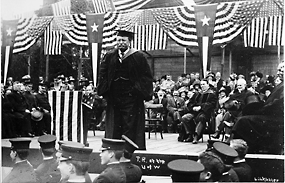
Theodore Roosevelt address the UW community. Photo courtesy of UW Special Collections.
Teddy Warns of Salmon Destruction
“All of us know by rather painful experiences that river fisheries are only too easily exhausted and are finding it also true of our sea fisheries. … And so, if you permit men to make a good deal of money for a few years by completely destroying the salmon industry in any river, it is your own fault, because if you choose you can keep it as a permanent industry, be handed on among the permanent assets of the state, to the generations that are to follow you.” April 1911
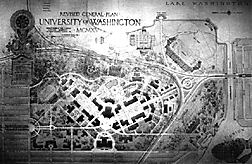
This 1915 campus plan by Carl Gould drew on the 1911 model by the Olmstead firm.
Olmstead Firm to Plan the Campus
At a meeting of the Board of Regents this week, it was voted to complete arrangements with the famous Olmstead Brothers, whereby the firm is to draft a preliminary plan for the laying out of the university campus. … There are wonderful possibilities here and we use the word “wonderful” with full knowledge of its meaning. There is no campus in the country surpassing this one for natural setting. How important, then, that all the future steps for its beautification be taken according to some definite plan! May 1911
Old University Pillars Raised
The erecting of the columns which were brought around Alki Point in the earliest days of the University was the main feature of Campus Day, April 28. The seniors raised the columns at the foot of the walk leading from Denny Hall to the giant flag pole. May 1911.
War Between Leading Nations ‘Impossible’
“The cost of preparation for war in time of peace is becoming so great that it consumes the earnings of commerce. … Although the burden of increasing taxation and the high cost of living in the world is causing a universal unrest, the amount of money spent in armament is increased annually by the machinations of the armament trust—perhaps the greatest in the world. Thus there is talk of war in order to keep up the expenditure, when in reality war between the leading nations is impossible. For the improvements which science has made in the weapons of war and the great cost of them would prevent a nation for risking their utter destruction in a few hours’ battle.”—Dr. David Starr Jordan, June 1912.
Golfers Plan Links on Lower Campus
Some of the golf enthusiasts among the faculty are planning a golf course on the campus. Not being able to do the work themselves, they have arranged with the city, which maintains the lower side of the campus, to clear and grub a tract of land below the railroad track suitable for a four-hole course. It is the intention to increase the size of the course as the land is cleared. October 1912.
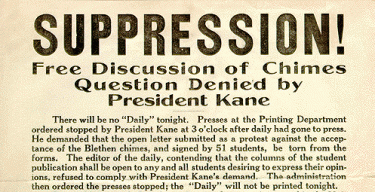 Alumni Condemn Blethen Chimes Protest
Alumni Condemn Blethen Chimes Protest
[Alden Blethen, publisher of the Seattle Times and former UW Regent, donated funds for the construction of a bell tower and purchase of campus chimes. The gift announcement came only weeks after the dismissal of a grand jury indictment against Blethen for his alleged connections to gambling and vice interests that controlled the city government. The day before the chimes dedication, the Daily planned to print a protest from 51 students, but President Thomas Kane stopped the presses and the newspaper did not appear for two days.] It is the judgment of The Alumnus both that President Kane was right in suppressing the communication of protest submitted by 51 students on the day before the new chimes were installed at Washington; and also that the students were right in objecting to the “suppression.” … The gift was announced at Christmas time, one year ago, and the time for objections had been long past. Common decency demanded that the Washington undergraduates, regardless of the matter in controversy, should play the gentleman and exercise common courtesy to a varsity guest. In suppressing the article, President Kane was fully justified. On the other hand, the students, under the self-governmental system as it now exists, were entitled to print whatever they pleased in their newspaper. … Editor [Andrew] Eldred had the prerogative of “playing it up” on the front page or in any manner he saw fit.” November 1912
C’est Magnifique— Bernhardt Visits UW
“The University of Washington … is what is truly perfect in Seattle. … The amphitheater for lectures and public exhibitions is perfectly beautiful. It reminds one, because of its admirable situation, of the amphitheater of Taormina, with its hills on the one side and the sound of Messina on the other—like a natural decoration. Here, too, are numerous mountains with their eternal snows, and Lake Washington, which lies beyond the amphitheater, is magnificent. … After breakfast [I] returned to the University to pay a visit to a young woman who was ailing and wished to see me. The girls take part in nearly all the classes, but the boys do not follow the courses in cooking. The girls alone follow it, and I regret that they are instructed only in American cooking.” February 1913
Shades of McCarthy: Loyalty Oaths Considered
[The state legislature considers requiring a loyalty oath to the federal constitution.] Those who do not believe in the fundamental principles of freedom and of republican government which the constitution prescribes are those whom this nation has to fear. The time is coming when this class will be separated from the true American citizens, as were the sheep from the goats. The proposed bill will never accomplish that end. Its introduction is worthy in one respect—it has served to call attention to the fact that anarchism should not be tolerated at the University of Washington in either the faculty or student body. By this we do not include true Socialism. … Washington has many earnest students of socialistic and economic problems in its midst, and these are as loyal supporters of American traditions as are those of other faiths. February 1913
President Thomas Kane ‘Retires’
After three college generations of incumbency, President Thomas F. Kane has been forcibly retired from the headship of the university. With a suddenness which was rather more apparent than real, the regents demanded his resignation, were refused it, and dismissed him. … For real acrobatics, we recommend the double-flip of Dr. Kane. In his fight to stay he became a progressive! Rally, ye progressives, and save him, lest ye be delivered into the hands of the reviled stand-patters! Dr. Kane in his administration was and is about as much of a progressive as President Taft, formerly of Cincinnati and Washington D.C. He was and is a man “of feebly good intentions, entirely surrounded by men who know just what they want. December 1913
President Addresses Students About the Great War
“Irresistibly there comes to us a feeling of sadness and depression because of the unhappy condition of other universities and other student bodies in other lands. Over all Europe hangs the black canopy of war—the attack of brother upon brother—the blasting of hope and the end of life itself for tens of thousands of university men. A few universities have been destroyed—others will not reopen for some time—some will open with depleted ranks—all are saddened and perturbed. The great dark cloud which hangs as a pall over the universities of Europe should give us a sense of divine thankfulness that we are free from the great human passions peculiar to the roar of war.”—UW President Henry Landes, October 1914
A World Gone Mad: War Begets Insanity
“[A] social consequence of the Great War must be an increase in insanity and crime. … Many minds are not able to stand the increasing strain of our complex civilization. Particularly is this true wherever exceptional conditions of emotional stimulation exist. The present war furnishes, as never before, just those conditions of emotional excitement and mental strain which must result in over-throwing the mental balance of many people. … If 25 or even 50 years shall prove sufficient to overcome the set-back to civilization from the ruin of this conflict, the world may count itself fortunate, indeed.”—Political Science Professor Walter Beach, November 1914
Suzzallo Salary Sizzles
Dr. Henry Suzzallo, professor of philosophy in the teachers college, Columbia University, was elected president of the University of Washington at the May meeting of the Board of Regents. He will succeed Acting President Henry Landes. … Dr. Suzzallo will take office July 1, at a salary of $10,000, which is an advance of $4,000 over the salary of his predecessor. June 1915
What’s the Matter with the Freshmen?
“Of those [freshmen] who entered the University last fall not more than 40 percent, or 50 percent at the most, will be back when college opens this month. … The plain truth is that the freshmen are the victims of pedantry. … The time has come, then, for those in charge of the freshmen program to ‘right about face.’ The present course of study has brilliantly demonstrated its futility. It ought to be revised with the sole and single aim of arousing the freshmen, of opening up life to them in as large and significant a way as possible.”—Professor Frederic Padelford, August 1915
UW Goes Gothic
The new Home Economics Building will be constructed immediately from the building fund created from tuition fees. … The type of design for the entire quadrangle will be collegiate Tudor. … Washington is in the same latitude as France. The Gothic time of window opening was developed as a matter of necessity as light was required in the great villas and cathedrals. The Home Economics Building with its light area, accentuated perpendicular lines and gables, has Gothic features. November 1915

British troops go “over the top” in this 1915 photo, courtesy of the Trustees of the Imperial War Museum, London.
Gas Attacks: There is No Hope
This is the story of my personal experiences in the Western theater of war in France and Belgium. I fought under the colors of Canada, and with me always, too, were the purple and gold of Washington. … On April 5th we crossed the Belgian frontier. In the afternoon we arrived at Ypres. … It was on this field that I witnessed the first German gas attack. … The enemy had in their trenches huge cylinders with this gas compressed to a very high pressure. When the wind was from them, the cocks of the cylinders were opened, allowing the gas to flow out. It rose to a height of 40 feet, and being heavier than the air, it advanced slowly with the wind, forming a large sheet or cloud. The French Algerian troops … stood it until it came up to them, and then, taken by surprise, they were unable to withstand its effects. One breath of this is sufficient to daze a man to such an extent as to render him absolutely helpless. Those who got a very bad dose of it turned purple in the face; they coughed and gasped for breath in awful pain. Gradually amid untold sufferings, the lungs fill up with a sort of white secretion, which finally chokes the poor soldier and puts an end to his misery. All this takes three of four days, and there are no antidotes known. There is no hope; there is nothing but to let the men die amid the most awful agony a human being can behold. The gassed have separate hospitals; they are never put with others, as the sight of their sufferings is too much to behold, even for the hardiest soldier.—Aimar Auzias de Turenne, ’15. December 1915
Coach Dobie Resigns—and Returns
The resignation of Gilmour Dobie as football coach at Washington and the formation of a coast intercollegiate conference were events of interest to the general public. Coach Dobie retires after bringing eight championships to Washington. In his entire coaching career he has never lost a game. His record as a coach compares with any in the country. The successful gridiron mentor does not announce definitely that he is through with the game for good. He gave out before his departure … that if he takes up coaching again it will be east of the Rockies. December 1915 * Gilmour Dobie will coach Washington football next year. … The story goes that Dobie came in responses to a telegram from Madison, Wis., and that he was prepared to go East to go into conference with the athletic authorities at the University of Wisconsin. However that may be, the Washington board members were able to prevail upon Coach Dobie to consider their proposition. February 1916.
[There was no Washington Alumnus published between May 1917 and March 1920.]
1920s
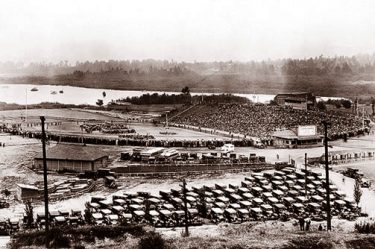
Cars surround the stadium on the day of its opening in 1920. File photo.
Twenty Men Could Fund the Entire Stadium
The statewide campaign of University of Washington alumni to raise $500,000 to erect a stadium on campus is on—$157,000 was pledged to the stadium fund by alumni outside of Seattle. … At the alumni meeting … the tentative plan for the sale of bronze plaques, entitling purchasers to reserved seats at all events in the stadium for periods of two and five years, was unanimously adopted. … William J. Coyle, president of the association, said that are 20 men in Seattle today who would donate outright the $500,000 required if asked to do so, but that the desire of the association is to have all alumni of the state participate in the enterprise and to offer some return for the money given. March 1920
Husky Cirque? Debate over Stadium Name
After a discussion which lasted for three and a half hours, the name contest committee to decide the name for Washington’s stadium adopted the title “Washington Field.” … The discussion simmered down to five proposed names: Field, Cascadium, Crater, Magnet and Cirque. April 1920 * The greatest alumni reunion ever held in the West will be called to order on November 27 when the referee blows the whistle that starts the Washington-Dartmouth football game in Washington’s new stadium. Thirteen thousand students have attended the University of Washington at some time or another since 1852 [sic] and every one of them, still alive, has signified his or her intention of being present. October 1920
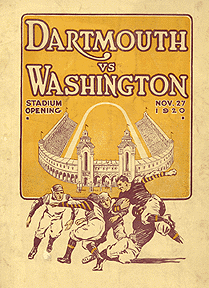
The program cover from the grand opening of Husky Stadium, then called “Washington Field,” didn’t include the final score–a 28-7 Dartmouth victory. UW Libraries Special Collections.
The Homecoming—The Stadium—The Game
When we reached the stadium at one o’clock, …we came fearing to see a vast mud puddle, more suitable for aquatic sports than for football, but a glance at the playing field dispelled all fears; the honeycomb drainage system had stood the test of over 40 hours of heavy, soaking rain, which had only ceased sometime in the early morning of the day of the game. … A detailed account of the Homeric struggle would require more space than is at my disposal; suffice it say that the best team won. Eighteen Washington men … fell before a machine, a powerful, smooth running Juggernaut, 1920 model. The visitors [Dartmouth] … won a cleanly played, well earned 28 to 7 victory. November 1920
We Shouldn’t Be Afraid of New Ideas
New ideas may perhaps be bad, very bad, but they may be good. Unless they are expressed, no one will know whether they be good or bad. …A university affords a place where new ideas my be brought forward and subjected to rigid criticism. If bad, they will in time perish from their own weakness without the necessity for political suppression. If good, society will be benefited. No university should become an incubator for treason or sedition. Yet … there is a great difference between the scientific analysis of an old and new idea, and the attempt to enforce acquiescence in others to one’s own ideas. … The former is necessary to progress. It should no be suppressed by legislation in the blind fear that an unwelcomed truth may be discovered. The American public at large is so busy making money that it does not appreciate the advantage to itself of having a place where people … may be encouraged to think clearly and, through seeing all sides of a question, work out its solution. Editorial, March 1921
Unlimited Immigration is ‘National Suicide’
“We are told that there are 20,000,000 people in Southern Europe who are trying to get means to come to this country. … These people are the down-trodden, more or less incompetent, feeble-minded, degenerate of Poland, Bulgaria, Romania, Serbia, Hungary, Czechoslovakia and Italy. The records show that an overwhelming proportion of people who commit crimes come from immigrants or the sons of immigrants. … We must remember that what we are getting now is not the old group of hardy pioneers, but the refuse of Southern Europe. … The allowing of this strain of undesirable blood to come across the seas is nothing short of national suicide.”—Charles A. Processor, president of the Dunwoodie Institution of Minneapolis, in an address to Seattle alumni. April 1921

Because of the gray Seattle weather, a 1915 planning committee chose Gothic architecture to provide “a maximum of light.” Suzzallo Library façade by Mary Levin.
Planning for the Ultimate Library
“Since the Library is the great center of interest of the entire University, intellectually speaking, it naturally should personify this idea in its physical expression. Therefore, the building on the exterior will be of considerably greater importance than any building yet erected, with a façade rising 80 feet, with a high roof. Above all will be a great tower, the foundations only of which will be put in at this time.” Carl F. Gould, November 1992
Students Should Live on $60 a Month
Very economical students at the University of Washington can pay all their individual expenses, including board, lodging and fees, on an average of $60 a month, according to an analysis of student living costs which President Henry Suzzallo has prepared. These figures also show that an economical student can pay all his expenses, and have all the extras he ought to have, on an average of $65 a month. A student who is given more than an average of $75 a month, according to President Suzzallo, is regarded as a liability to the University, to his family and to the student himself. January 1923.
Dean of Women Lists Careers for Coeds
More than 50 specific careers are open to women graduates of the University, according to a statement given out recently by Miss Ethel H. Coldwell, dean of women. Many of these are in lines of work allied to home economics, business administration and science. … Other professions open to women graduates of the University include advertising, newspaper, editorial and literary work, public health nursing, social welfare, playground direction, statistical and secretarial work, and employment management. Many women graduates become pharmacists, bacteriological technicians and psychologists, while positions in salesmanship, vocational guidance, the law, banking and general scientific research are open to them. June 1923
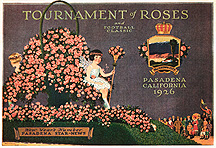
Program cover from the 1924 Rose Bowl.
Our First Rose Bowl: “We Really Won”
Scheduled to participate in the biggest intersectional gridiron contest in the United States, the University of Washington Huskies will meet the Navy in a post-season game at Pasadena on New Year’s Day. The game will be a part of the Tournament of Roses festivities. Coming at the climax of a successful season, an invitation to play the Navy team at Pasadena resulted in faculty approval and a vote of acceptance from the Washington players. December 1923 * “I am not going to try to give you a sport writer’s account of the game, because I am not able to, and it is too long a job. … The game was a tie, as you are aware, although we felt that we really won the game from the standpoint of football, and owing to the fact that our field goal missed the post by only two feet.”—Anonymous Reporter, January 1924.
Legislator Threatens to Dump President Suzzallo
President Suzzallo at an alumni meeting in Yakima on April 14 declared that Duncan Dunn, a member of the legislature from Yakima and a regent of the State College (now WSU), is the worst enemy that the University has. The President made particular reference to Dunn’s efforts to divert from University purposes the revenue from the original site of the University. … Dunn, when informed of Dr. Suzzallo’s statements, is reported to have said that he would again run for legislature and that “one of my principal platform points will be to secure a state university president for less than $18,000 a year.” May 1925
George Wilson Better Than ‘Red’ Grange?
Is George Wilson the greatest halfback that ever wore a Washington uniform? Some say “Yes;” and some say “No;” but all agree that his peers are few and remarkably far between. Nebraska stopped the great “Red” Grange, … stopping George Wilson they found to be a different matter; totally and entirely. If we may credit the records of yardage made and the word of the Nebraska players and coach, George Wilson is greater than Grange. November 1925
Outclassed in the ‘Carnival of Roses’
Washington and Alabama will furnish the attraction at the football game played at Pasadena in connection with the Carnival of Roses, on Jan. 1, 1926. Except from the financial standpoint, there is little to be gained by participating in the South-West Classic. In the national ratings Washington is already put above Alabama so we get no glory if we win and the razzberry if we lose. Jan. 1926
No excuses are necessary as to the outcome of the Pasadena game. The small handful of devoted supporters who accompanied the team and coaches were hopeful but not optimistic. Our boys … tried to get back into the fall spirit for a game that was really an anti-climax. … Alabama was primed for the game, was acclimated and had the support of the crowd. Its men played to win. … That our team was not greatly outclassed is indicated by the fact that it made as many touchdowns as Alabama, losing out only by the failure to kick goals. Feb. 1926
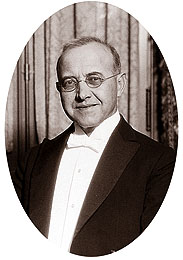
President Henry Suzzallo poses during a visit to Seattle after his firing. Suzzallo had hopes that the governor behind the dismissal would face a recall election, but the attempt failed. File photo.
President Fired, Students March, Alumni Exiled
[In October 1926, regents appointed by Gov. Roland Hartley fired UW President Henry Suzzallo, causing student demonstrations and a call for a strike. Suzzallo told students to return to the classroom. The UW Alumni Association and others tried to oust Hartley through a recall initiative but failed to get enough signatures. Two years later, UW officials told the association to leave campus.]
Regents meet at 3:30 p.m. and Gov. Hartley (appointed) regents vote to ask Dr. Suzzallo to leave. Regents John Heffernan and Mrs. Ruth McKee voting “nay.” Dr. Suzzallo refuses to resign and is given indefinite leave of absence. David A Thomson, dean of College of Liberal Arts, is named acting president. … Students stage great demonstration and threaten strike. Dr. Suzzallo persuades them to return to their classes. … Alumni association executive committee meets and issues the following statement: “The removal of Dr. Henry Suzzallo forcibly calls the attention of the people of the state and nation to the fact that Gov. Hartley is attempting to make a political football of the state’s educational institutions. … Gov. Hartley’s regents, without assigning any cause reflecting on his qualifications for the office, have removed as president of the state university one of the foremost educational administrators in America—a man who had in 10 years built a great University while keeping the cost per student lower than at any comparable institution.” November 1926
Raising ‘Hec’: Pavilion is Dedicated
The realization of a glorious dream. … A few brief months ago the site of the Athletic Pavilion was a barren patch of brown dirt and scrubby bushes. Now, standing in regal splendor is the consummate conception of far-seeing men and women who know the needs of a great University. This half-million dollar plant will be fittingly dedicated with a series of basketball games between the University of Illinois and the UW. December 1927.

This Camel ad from 1934 was the first of many cigarette ads that ran in the old Washington Alumnus.
Is Smoking Hazardous to Your Health?
The members of the department of Psychology have some 30 research projects under way or recently completed…. Dr. [Ralph] Gundlach has three particularly interesting investigations under way. For one he is making a drive from a new angle on the physical effects of smoking. Previous investigators have been unable to secure subjects who would drive themselves to the utmost week after week. Through the cooperation of Coach Edmundson, whose men do not go into strict training until January, Dr. Gundlach is able to make a study of the effects of tobacco under better conditions. November 1929
Hemingway’s A Farewell to Arms: Birth of the Anti-Hero
“So depraving is the effect of the war that the reader’s sympathies turn to the support of the hero, praising and approving him as a deserter. Indeed, the author creates the impression that every man whose sense of decency was not entirely demoralized by the war would follow his example and desert from the army. Thus we have a complete revaluation of values; a state of affairs in which the hero is a deserter. Certainly [this is] a new commentary on the modern world in which the traditional villain has become a modern hero.”—English Professor Sophus Winther, November 1929.
1930s
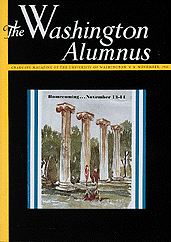 Boeing Boy Wonder
Boeing Boy Wonder
Back in the days when calling a person “air-minded” implied the literal connotation, Philip G. Johnson, ’17, stuffed his degree from the College of Education in his pocket, gambled on the future of airplanes and went down to the Boeing Airplane Company to secure a job as a draftsman in the engineering department of the aircraft factory. Today … Phil Johnson is president of the largest airplane factory and the largest air transport system, in point of mileage flown, in the United States. He is the youngest executive of a major aviation company in the nation and the story of his career would have made hot copy for Horatio Alger. February 1930
Glimmers of the Market Crash
[From a full-page Puget Power and Light ad] Thirty years have tested the management of this Company to meet the boom growth of a frontier country; the depressions that have followed; the whims of the fanatic; the vagaries of the elements and the unprecedented demands for its service during the late war. Its integrity of management has provided the necessary supply of capital to carry on its development in fair weather days and in periods of financial stringency. The trying days of last October and early November proved the stability of its Preferred Stock in the markets of the country. For those who seek a conservative investment with fair rate of return (6%), we recommend the Preferred Stock of the Puget Sound Power and Light Company. March 1930
Hints of a Crisis: Navy Cruises Canceled
Lack of appropriations by economical Uncle Sam has caused the temporary abandonment of the winter naval ROTC cruises in Puget Sound waters, University naval officials recently declared, sadly. It is hoped that the Navy Department will be able to provide the necessary funds for fuel before spring. December 1930
‘Spectacle’ of Crime Shows Helpless Society
“The picture which one may very easily find himself creating from the news items which appear every day in any large metropolitan newspaper is not a too pleasant one. It would seem to be something that would justify the most hideous nightmare of the bluest social alarmist. … The spectacle which our newspapers present us in the story of bootlegging, racketeering, profiteering, murder, vice and crime throughout our land shows how helpless a society is when its citizenry lacks desire and power of self-control. … We might well ask ourselves whether a proper direction of the might educational forces of our nation would not do more to heal the wounds and soften the hearts and dry the tears of groping humanity, than can all the forces of social compassion and political demand that narrowness and bigotry can ever assemble.”—Education Professor Eugene Bishop, February 1931
‘Alleged’ Depression Keeps Kids Coming
Maybe its because of the alleged business depression, but Winter Quarter registration at the University is the largest in the institution’s history—7,075 students—an increase of 15 over the high-mark of a year ago. All this in spite, or perhaps because, of stiffer scholastic standards! February 1931
Depression Forces State to Being Cutting Education
When the University’s regents ended a lengthy session on March 30, it was after the completion of the difficult task of readjusting the biennial budget to meet a reduction of $335,000 imposed by the last legislature. … Methods of economy include: Cancellation of certain previously contemplated faculty additions; certain reductions in the present staff; and rigid economies in the maintenance of the University campus. … There will be no salary reductions. April 1931

This Boeing Model 100 was a military trainer. Only in the 1930s did passenger air travel become popular. Until then, planes were designed for military use and to carry mail. Photo courtesy Museum of Flight.
Cure for Traffic Snarls Found: Airplanes
Because of the economic necessity created by the aircraft, the city of 1950 will so differ from the city of 1931 that our children will marvel at the stupidity of their fathers. We believe the airplane will have a greater influence on the redistribution of populations than has the automobile; that it offers the best solution of our present traffic problem of any agency now on the social and economic horizon; and we believe that regional planning commissions who fail to grasp the significance of air travel will have labored in vain. … By 1935 there will be as much public interest in the construction of landing fields as there now is in the construction of highways. — Aeronautics Professor J.W. Miller, May 1931
Cuts Even Shut Down Quake Detector
The University seismograph, the only one in the Northwest, will record no more earthquakes for awhile, because the legislative cut in the University budget wiped out its appropriation, and for the present it has been stored away in Johnson Hall. April 1931
No Vestige of Communism Preached on Campus
Would you believe that the Universe aided and abetted the advocacy of Communism? Such seemed to be indicated when generously proportioned reports were printed in at least one Seattle newspaper of a meeting May 19 on the campus which Joseph Freed, ’27, was a speaker. Freed discussed Communism in present-day Russia. … Lively newspaper reports followed for the next two or three days, with headlines which shrieked the connection between the University and Communism. The affair, however, subsided following the published statement from President Spencer that the incident would result in no one being called on the carpet … and that most emphatically there was not, nor would there be, any vestige of Communism preached on campus. June 1931
The ‘Pinch’ of the Depression: Poorer Students Forced to Leave
The University has felt the pinch of the present economic depression and the administration has been forced to use great care in the spending of funds, lest essential educational processes be not impaired. Loan funds for needy students have been more in demand than ever before and, in all probability, a higher number of excellent students have been forced away from a college education because of money shortage. The President has, during recent months, addressed appeals for financial aid to public-spirited citizens believed to be interested in the University and, doubtless, forthcoming months will bring responses. December 1931
Awakening from a ‘Fool’s Paradise’ to a Cold Reality
“We in America emerged from the struggle [World War I] apparently in the healthiest, wealthiest condition it had ever been our fortune to enjoy. … A new and glorious start for higher peaks of human satisfaction and dazzling world-supremacy—and then we awoke to find it all a dream. Disillusioned we emerged from this Fool’s Paradise into a world of cold and inexorable reality, where the sight of silenced mill and workshop, haunted by the grim specter of want and the unmerited suffering of millions of fellow human beings, plunged us into the depths of sadness and despair. The evil wrought by man in half a generation cannot be repaired in a year or two. But it will be repaired in time, but only by a fundamental setting of the world’s house in order.”—Business Professor M.M. Skinner, December 1931.
Books Save Jocks from Bankruptcy
“Due to the Depression and other causes our final returns showed the 1931 season produced only $131,041 or over $45,000 less than the football revenues of 1930. … We had $45,000 in bonds maturing January 1, 1932 and did not have the money to retire them. General conditions had tightened considerably and it seemed impossible to receive help from our bankers. … We pledged 40 percent of the remaining ASUW fees and also the net revenues of the University Book Store for the year. After considerable discussion this plan was accepted by the banking institutions. A second major problem is what is going to happen at the end of 1932 when $95,000 worth of bonds and notes come due. … It will be necessary to work out a refunding plan; perhaps either to declare a moratorium for three years or to get help from the University. … If something is not worked out, the bonds will go into default and the situation will become more serious than it is a present.”—Merville McInnis,’21, alumni member of ASUW Board of Control, February 1932
State Pay Cut? Professors Should be Last, Not First
The University’s faculty faces the possibility of a sharp reduction in salary. … The state’s most highly trained servants should be the last group to be cut—not one of the first. University salaries are low at best. … There are few alumni in business or in a profession who have not felt the effects of the Depression. Likewise, there are few alumni of older years who did not definitely benefit from the lush years where industry was fattening with profits. Faculty salaries, however, moved slowly during periods of high prices; they gathered no heavy surplus during war days nor days of price inflation. … It is difficult to see how the state, and the taxpayers of the state, would benefit from such a cut now. April 1932

Dorthea Lange’s famous picture of a ‘Migrant Mother’ at a 1936 California work camp is one of the most haunting images of America’s Great Depression.
Crisis Worsens: Regent Warns of Closures, Salary ‘Warrants’
[During the Depression, many school districts closed early, while others replaced pay checks with “warrants,” promissory notes that the school district pledged to honor sometime in the future.]
“Owing to the heavy shrinkage in tax collections there is an anticipated deficit in the University of Washington operation fund by March 1, 1933, of over $200,000 (nearer $300,000), as there exists such extraordinary delinquencies in tax collections. … There are going to be (have been some now) many schools closed over the state before the end of the term and , as you know, there have been many on the school warrant basis, and that the teachers are having to take a very substantial discount on warrants unless some accommodating friend will cash them. You are fully aware that there would be the severest criticism from all over the state if the time came when there was a choice of either the University closing for a while or the employees having to accept paper which they might have difficulty discounting at even 10 percent, as many teachers have already experienced.”—Chairman of the Board of Regents Paul H. Johns, May 1932.
Book Store Saves ASUW from Bankruptcy
The recognized business stability of the University Book Store has saved the ASUW from impending bankruptcy. A loan of $50,000 has been made to the Book Store, conditional upon separate incorporation of that institution, with the understanding that $30,000 of that total be in turn loaned to the ASUW. … All of the [book store] stock is held by the ASUW. June 1932
Depths of Depression—Colleges, Pay Slashed
A sweeping reorganization of the entire University was authorized by the Board of Regents July 19. … The 13 schools and colleges previously existing, each under the direction of a dean, will be consolidated into but four administrative units—two colleges and two schools: College of Arts and Sciences, College of Technology, Law School and Graduate School. … Included in the economies have been the following: Elimination of the offices of deans of women and men; … A faculty salary cut of 10 percent effective October 1; …Radical curtailment of the teaching program in both men’s and women’s physical education; … Reduction of expenses in the building and grounds departments to an extent which meant no further watering of the acres of campus lawns and the virtual elimination of gardeners. August 1932
Governor, Regent Attacked in Time Magazine Article
[The Alumnus reprints an article from the August 8 ,1932 Time Magazine on the reorganization plan.] “Roland H. Hartley is currently campaigning for his third term as governor of Washington. A former timber operator, he has never been known as a champion of progressive education, or even of that handy motto ‘education for all.’ … Actual administration of [the University of] Washington is not President M. Lyle Spencer but William Neal Winter, regent and business manager installed by Gov. Hartley. Regent Winter is a practicing Spiritualist, with a ‘control’ known as Hugo. Last week Washingtonians were wondering publicly, ‘Who has control today, Hartley or Hugo?’ ” September 1932
Registrar Predicts Crippling Enrollment Plunge
A sharp decline in enrollment is expected this fall; conservative officials estimate an attendance not to exceed 5,000, as contrasted with approximately 7,000 of recent fall quarters. This is not attributed to the general reorganization but to general business conditions and comparatively high University standards. September 1932 * Registration for the fall quarter discloses an attendance of almost satisfactory proportions, in view of disturbed economic conditions. An unofficial total published on Oct. 14 was 6,369, which is contrasted with an enrollment last fall of 6,924. Predictions made during the summer were for a markedly smaller student body this autumn but last-minute decisions by wavering students to return to college have raised the total. November 1932
Clergyman Condemns Temperance Dry Squads
Dr. Herbert Gowen, professor of Oriental Studies and a noted Episcopalian clergyman, has no patience with people who attempt to make prohibition a “religious issue, when it is nothing of the sort.” Furthermore Dr. Gowen declares that prohibition has been a trying foe for true temperance. … Dr. Gowen deplored what he termed “ministerial dry squads” and declared that he was opposed to prohibition. November 1932
President Says C Minus Students, Women Welcome
“Let me explain how low our entrance requirements at the University actually are. To get into the University a student need make only a C minus grade in each of his studies during the last three years of his high school course. His first year in high school is not taken into consideration. … Let me correct a queer but prevalent misunderstanding that the University is contemplating abandonment of coeducation. It is not. The state is committed to coeducation and the University could not consider abandonment of it.”—President M. Lyle Spencer, October 1932.

Franklin Delano Roosevelt’s landslide victory installed Democrats in the state Legislature and governor’s mansion. The new governor replaced Republican-appointed regents who planned to cut UW departments. Photo courtesy of FDR Library.
FDR Landslide Transforms UW Campus
[The Democratic landslide of 1932 brought a new governor—Clarence Martin, ’06,—who named a new Board of Regents. The days of the president who replaced Suzzallo were numbered. The alumni offices, which had been moved off campus following Suzzallo’s firing in 1926, were invited back.]
There is a new spirit at the University today. Governor Clarence Martin , ’06, fulfilling earlier promises, named an unusually qualified group of citizens to the Board of Regents. … The board announced its firm intention to study and to readjust the radical reorganization of the University ordered last summer by the retired board. … A letter containing an offer of resignation was also received from President M. Lyle Spencer. The board still has the resignation under advisement. … Alteration of University entrance requirements has also been ordered by the board. With certain exceptions, graduates of accredited high schools will now be admitted to the University without further scholastic qualifications. March 1933
Spencer Out, Winkenwerder In, Salaries Slashed
The UW was given a new administration Sunday, March 26, when the Board of Regents voted to accept the resignation of Dr. M Lye Spencer as President. He was relieved of active duty at once. … Dean Hugo Winkenwerder, veteran forestry head, was named acting president. April 1933 * Sharp reductions are being made in University salaries, averaging about 30 percent on the basis of 1932 salaries, but the exact individual applications have not been revealed. Acting President Winkenwerder declared, however, that the percentage reductions will be greater in the higher salary brackets. May 1933 * Most difficult of the board’s problems is that of the writing of the budget for the next two years. Estimates from Olympia indicate that there will be available from state tax funds approximately 50 percent of the amount available two years ago. Drastic reductions must be made. … Everyone interested in the University would appreciate the very fine spirit of cooperation upon the part of the faculty in accepting this drastic readjustment of their salaries.—Regent Lewis Schwellenbach, ’16
Liquor Industry Has a ‘Cheering Word’ as Prohibition is Repealed
[Excerpts from an ad by Schenley Distillers in January 1934] “Liquor and Faith: a heartening word about quality for the 73% who voted ‘Yes.’ After these 14 years of barred distillery doors, of rusting vats and stills, of grapes rotting on neglected vines, and empty warehouses, in which fine old whiskey should have been richly mellowing—after these 14 years of such discouraging activity, you must be inclined to wonder how really fine wines and spirits may now be produced or bought. The Schenley Distillers Corporation has a cheering word for you today. During those dark years, many discouraged leaders of our country’s legitimate liquor industry lost their hope and turned to other trades, yet there were a few who never lost faith. … During your long wait, this undiscouraged organization has been quietly visiting and inspecting the most famous plants throughout the country. … We gather together under our protection those distilleries which measured up to our highest standards.” January 1934

The atrocities committed during Hitler’s rise to power didn’t disturb one UW alumnus, who compared them to Klu Klux Klan “affairs” in the U.S. Photo courtesy of FDR Library.
Discussing German Atrocities ‘Isn’t Good Form’
[From an interview with a scholar returning from Europe, Carlton Wood, ’32] “Germany is entitled to more understanding and more sympathy than the world has accorded her in her present plight. She has been caught in the throes of great economic readjustments, and it is not intelligent for outsiders to comment on what they may read in daily newspapers or pick up from hearsay, ” he said … Concerning the atrocities, Dr. Wood said he knows they happened, although he never saw any personally, and they were deplored by every decent German and looked on as an inevitable part of the party program by the Nazis themselves. It isn’t considered good form to speak of them, the Washingtonian said. They are something like the Ku Klux Klan affairs in this county. September 1934
Paper Says UW in Sinister Nexus with Communists
The local Hearst mouthpiece, the Seattle Post-Intelligencer, has succeeded in manufacturing a Red Menace on the Washington campus. In a distorted story, not worth a paragraph to the other Seattle dailies, and given 10 times more space than its value even by the canons of yellow journalism, the University is made to appear in sinister nexus with the Communist International simply because one of our professors recounted his war experiences at a downtown meeting in behalf of world peace. … If it give any relief to nervous taxpayers or property-owners, we assure them that the student family is still in 1935 more conservative than any cross-section of the citizenry. … The genuine danger on our campus and in the American community today is not from Communism but from the fascism that Hearst and others are recommending and spoiling for daily. February 1935
Federal Aid Makes the Difference for Many Students
“The University has nearly 9,000 students on its campus day by day. … Federal aid was actually extended to 766 students, this being the stipulated quota. … Students are provided with work that enables them to earn $15 a month, working 37 1/2 hours at 40 cents an hour. … Frankly some of us who had the responsibility for launching and directing the project had our misgivings. … We have been amazed to recognize that the scant margin of $15 a month so often spells the difference between opportunity and deprivation as applied to college. The human interest stories so familiar to the trained social service worker were a revelation to us.”—Dean of Men Herbert Condon, February 1935
Putting Down the Paddles
Arrests and a night in the city jail tank followed the antics of four luckless freshmen pledges who were sent out on law-breaking errands by two fraternities. … Just as the newspapers were headlining these escapades, complaints came in to the administration that excessive paddle-whacking of freshmen was being indulged in and that one frail youngster had been in bed as a result. … Several of the leading fraternities, right in the middle of their “training week,” called a halt, absolutely abandoned the paddle. … It must be admitted that paddle-whacking as a means of “discipline” was quite dear to the hearts of a number of undergraduates who were quite sure that they were entitled to avenge the paddling they had received as freshmen. Even a few graduates expressed the opinion that it must be a soft generation that could not “take it.” March 1935
Greeks vs Coops: Lower Costs Draw Students
Alumni of Greek houses, particularly those who underwrote swanky Windsor Castle chapter houses in the days before the American Tragedy, will have cause to pull their thinning forelocks when they read the story of cooperative houses that have sprung up this year. … It seems, in the fifth year of the Depression, that board and room at half-price is a bigger lure to an increasing number of students a than an ox-roasting fireplace in the living room and an outsize fruit-closet in the basement. June 1935

The 1936 crew won the Olympic Gold Medal in Berlin. UW Libraries Special Collections.
Olympians Honored for 1936 Victories in Berlin
The Alumnus is glad and anxious to add its small voice to the acclaim of the world for the splendid victory of our Washington crew at the Olympics this summer. … Our crew, with their fine sportsmanship, their dauntless spirit as well as their capacity for winning, has spread the fame of the Alma Mater to every corner of the world as a builder of good men. Congratulations are due, too, to our human torpedo, Jack Medica, ’38, who won the world Olympic crown for the 400 meter free style. October 1936
An Encounter with Hemingway
Harry Burns of the English department … was sitting at a table in a café in Key West when an interesting looking person took a chair beside him and they struck up a conversation. … The acquaintance grew into a friendship that resulted in their journeying together by automobile from Key West to New Orleans. Burn’s friend turned out to be Ernest Hemingway. … Hemingway revealed … that he was a radical when some of the proletarian critics who now take him to task were not yet out of their dada-ist swaddling clothes; that contrary to Gertrude Stein’s version of the matter, it was not Stein who taught Hemingway what he knows about writing but the other way around; that he considers college professors to be a good sort and would like to be one himself; that John Dos Passos is a better writer than John O’Hara and Scott Fitzgerald because he has not only genius but brains. October 1936
The Soviet of Washington
[Political campaign ad from 1936] “The Nation Derides Us Today As ‘The Soviet of Washington.’ Shall this reflection on our citizenship, this blight on our political character, this blow to the business of our district and state GO UNCHALLENGED? Shall this condition of actual FACT go UNREMEDIED? Decide by your VOTE to wipe out the RED BLOT from the face of our state and check the cancerous growth for NOW is the TIME to DO it! … Thousands of liberals and Democrats will answer Communism’s challenge by voting for Fred. J. Wettrick for Congress, 1st District.” November 1936
The 1936 Rose Bowl: The Less Said, the Better
All honor to Jimmy Phelan, who led a fine Washington team, whose superb coaching was undoubtedly its greatest asset, to a decisive, thrilling Coast Conference championship and into the Rose Bowl, Mecca of every football team in the land. December 1936 * The less said of the Rose Bowl game at this writing, the more Washingtonians will be pleased, no doubt. The occasion should not pass, however, without a salute to the Husky team. Loyal alumni everywhere can take justifiable pride in the accomplishments of our team this season, and the fact that they were beaten by a better team New Year’s Day is certainly no reason to grouse. [Pittsburgh beat UW 21-0] January 1937
Huskies in Hollywood
A number of former University of Washington students have crashed the gates of Hollywood and made good in various capacities. The most recent and spectacular case, of course, being that of Frances Farmer, whose rise to fame was one of those story book affairs. … Fresh from her training under Sophie Rosenstein in the University’s drama division … Frances stepped right smack into stardom via a juicy contract with MGM. February 1937

Despite Stalin’s purges, one UW professor reported criticism of the Soviet government is “freely made.” Poster from Stanford University collection.
Civil Liberties in Europe: Dead in Germany, Alive in USSR?
“It is common knowledge that civil liberties in Germany have been dead since Hitler came to power. The press is entirely controlled and used for propaganda. The elaborate spy system prevents any expression that is opposed to Nazi philosophy. The censorship of the mails and of the telephone communications is so thorough that no private matters of any importance are transacted by telephone or by post. … In going from Germany into Russia, one finds more rather than less freedom. … Even with the purge of Trotskyites and saboteurs now in progress, criticism of the government’s methods and agents are freely made. … The purge is having a very definite and detrimental effect in that those in responsible charge of production hesitate to initiate any new undertakings or methods for fear that failure may subject them to the charge of sabotage. From the standpoint of freedom to work and to enjoy the fruits thereof, the USSR undoubtedly leads the rest of the world. … In Russia there is no unemployment, nor is there a provision for unemployment insurance. … Such insurance is unnecessary.”—Professor Richard Tyler, December 1937
President Defends Ban on ‘Outside Speakers’
[On Oct. 24, 1937, the Board of Regents passed new regulations on outside speakers, including the following: “No student club, organization or group shall invite an outside speaker …to address a meeting on the campus or in a University building.”] “No one denies the principle of the freedom of speech. We all have it, students and faculty, and is it the same freedom possessed by all citizens. That is quite different, however, from freedom of speaking. It is entirely within the legal powers granted to the Regents by the citizens of the state to restrict the freedom of speaking on the campus.”—President Lee Paul Sieg , March 1938
What is Television?
What is television? Just another gadget—another form of entertainment? No. It represents another step forward in man’s mastery of time and space. It will enable us, for the first time, to see beyond the horizon. And, in addition, it will create new jobs for today and tomorrow. … When, after years of labor, television is ready for the public, it will bring to the people of America a new product that will add to their comfort and enjoyment, raise their living standards, and create new employment for today and tomorrow.—General Electric ad, February 1939
Never Has a Colony Been so ‘Pampered’
The American occupation of the Philippines needs no apology. It has been something unique in the history of colonization. Not one Filipino in a 100 would make the charge of exploitation. Schools, teachers, good roads, public works, public health and sanitation, with a free market in the United States for Philippine products—the story has been told too often to bear repetition. Never has subject nation been so pampered.” — Manila-based businessman Ted Shelton, ’19. December 1939
1940s
‘We Need Intelligent Patriotism’
“I am satisfied from my observations that as a people we need no inspiration from abroad; we need not alien mentors among us to tell us here what to do or how to do it. … Before we think of others in this war-mad world, Americanism implies that we must conserve our own strength, put just limits on our governmental largess and using it wisely, protecting and perfecting our own institutions, solving our vexatious domestic problems, building happiness and contentment to the end that, out of respect for the success of our peaceful and prosperous example, a war-weary world may some day come to our way of life—the way of Americanism.”—Past American Legion Commander Stephen Chadwick, ’15. March 1940
Do Big-Time Leagues Dip into College Athletics?
“Certainly professional baseball dips into college athletics. Everyone knows that. Not often, but every now and then, baseball reaches its ladle into the college gravy bowl and comes up with a choice morsel in the form of a clean-limbed, clear-eyed young chap who wants to follow the game as a profession. … No one would criticize a student for quitting college to accept a business position that paid him a salary comparable to what a Coast League player gets. Why should he be criticized for quitting college for baseball? …The fact is, however, that the boy doesn’t need to do anything of the kind, … he’ll play ball and get his college degree too. … Fred Hutchinson signed with Seattle just as soon as he finished high school, made a sensational success, was sold to Detroit for the biggest price a minor leaguer has brought in years, and entered the University. He is 20 years old, has money in the bank [and] gets a salary that would be comfortable for a man considerably older. … You’d have a pretty hard time convincing Fred that he made a mistake when he entered professional baseball.”—Roscoe “Torchy” Torrance, ’23, April 1940.
We Woke to the Tune of Nazi Brass Bands
“We never expected Paris, our ‘home’, to fall as it did. We thought every shopkeeper would be out to defend his city. … But by June 10th Parisians had started their mass exodus from the capital. The Germans were only a few miles away; and the gunfire we heard day and night we knew was coming from “the front.” By June 13th … there wasn’t a human soul on the boulevards—only a few homeless dogs wandering in front of the Opéra. Even in such tense atmosphere one could not help noticing ironically humorous details. One fine lace and linen shop had taken time before it cleaned out to pin up three handkerchiefs—red, white, and blue—in an otherwise empty window as a final thumb-nosing gesture at the approaching enemy. … We slept at the Embassy, where I worked, that night. We woke the next morning to the tune of Nazi brass bands in the Place de la Concorde and the marching of the spruce, well-equipped German troops as they swung around the Arc de Triomphe, down the Champs Elysées, across the Seine and to the South. …The next nine months weren’t much fun. We had neither heat nor hot water, no thread of any kind, no soap, oil, tea or coffee, bath towels—often no potatoes, butter, meat, eggs or fish. Much of our stuff we got on a contraband market.”— U.S. Embassy employee Audrey Ames Cook, ’32. June 1941
The Japanese in China: “I’m Having the Time of My Life”
“Tuesday’s raid was the real thing. I had gone to the French Embassy to play bridge. We heard the planes, but it was a bright day and we couldn’t seem to locate them. Suddenly there they were, practically above us and heading straight over. We ran! The anti-aircraft was firing before we were halfway to the dugout. … The three of us huddled together. Then it came. Whoosh! Whoosh! and the Japs let go 160 bombs in our end of town. It’s horrible to hear them coming down, particularly if one is not in a strong dugout, because then you know that they’re near. The concussion nearly knocked us down as they landed, and we could hear them coming closer. … None of us thought we’d get out alive. And a bomb any closer would have finished us off. We dashed up when the racket stopped. … We toured the streets to see the damage, and I had my fill of horrors. Bombs certainly mess people up. Probably 400 or 500 killed. … The city is beginning to look pretty bad now. I guess there isn’t a house in town intact. Very few have any window glass left at least. Many have all the plaster down. Nearly every block has a couple of bombed places in it. … Nevertheless, believe it or not, I like Chunking very well and wouldn’t leave for the world. My job is fun … and my living quarters are still standing—and, all in all, I’m having the time of my life.”—Reuters war correspondent Betty Graham, ’37. October 1940
Magnuson Notes Strategic Value of Alaska Highway
“Congress until lately has looked upon the proposal with an indifferent eye, for Alaska has seemed a long, long ways off. … Alaska suddenly flashed into view when the Army and Navy pointed out its strategic value to the North American continent. No longer is it far away. It is only a few hours by air from the important cities of Seattle, Tacoma, Vancouver and Victoria. … In case of war (thought impossible when the first highway commission issued its study in 1930) few people would travel to Alaska by sea, but many would travel by land. … The road would be used for innumerable purposes beside tourist and settler traffic. It would have real military value.” —Warren Magnuson, ’29. December 1940
‘Greetings from Uncle Sam’: Peacetime Draft Begins
According to the present Selective Service Act, approximately 3,500 UW students have been required to register. This number comprises over half of the male students or one-third of the entire University enrollment. … If the act is revised to include men from 18 to 23 as has been proposed, then an even larger number of UW students will be affected. Approximately 80 percent of the male students, which represents almost 50 percent of the total University enrollment, would be included. May 1941
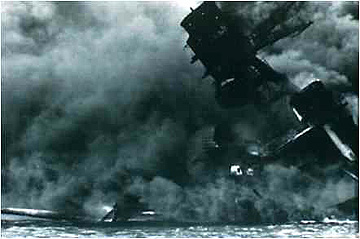
The USS Arizona burns after the Japanese attack on Pearl Harbor. Photo courtesy of the National Archives.
ALL OUT WAR!
As we go to press, with its fury and disruption, ALL OUT WAR has begun in the Pacific. Many of our alumni and recent students are in Uncle Sam’s army, navy, marines and flying services. Many of our engineers and other alumni are engaged in defense construction and in turning out war supplies needed for our armed forces. Many of our alumnae are actively serving in varied volunteer capacities where they are needed. Wherever they are and in all the capacities that they are serving the Democracy that educated them, we wish them ALL OUT SUCCESS. December 1941
‘Scoop’ Jackson on Intangible Enemy—Inflation
“The American people are now bending every effort to turn this Nation into a mighty arsenal of democracy. … The very magnitude of our task exposes us to danger from an intangible enemy whose subtle and swift attack may hit us hard. I refer to the danger of inflation. … Firm action by Congress to curb the speculator and profiteer must not be delayed. The number of those who seize upon a national emergency as an opportunity for private profit may be small, but their influence is extremely destructive. Immediate price control legislation is imperative.”— Henry M. Jackson, ’35. December 1941
Filipinos Treated ‘Like the Negro’
“Sprinkled through the Philippines are some 200 …UW alumni. Some people might just be a bit surprised about that. They have seen Filipinos on the skid road, in the whirling mill of the taxi-dance halls; they’ve seen them working in the fields, the canneries, the kitchens. Those are the only places most people have seen the Filipinos. … It has been pretty tough for them much of the time. There are 83,000 of them in the U.S. and their position has been a lot like that of the Negro in the South. That is why you find them—my people—in the lower end of town. What would happen if we tried to move onto Capitol Hill?”—Julius B. Ruiz, ’41. March 1942
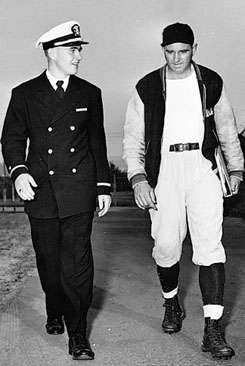
Football Coach Ralph “Pest” Welch (right) lost most of his juniors and seniors to the military. In 1943 the team only played four regular-season games against such opponents as the Spokane Air Command and the March Field Flyers. Photo courtesy UW Sports Information.
Where Have All the Young Men Gone?
The records show that upwards of 10 percent, or close to 50 members of the faculty, now are in service in the armed forces. … The enrollment of the University dropped below 10,000 for the first Fall Quarter in more than five years. … The largest number of withdrawals of young men [occurred] during Winter Quarter—totaling 584—entirely out of proportion to any other enrollment withdrawal period. … Registration officials believe that the greater portion of these young men entered civilian war work or the armed forces. … What effect the war will have on the sports situation at the University is problematical. Spring football practice indications are that Coach “Pest” Welch, barring any further losses, will have a well balanced football team. What will happen to basketball, baseball, track, crew and other sports cannot be forecast. May 1942
Japanese Americans Evacuated Without Any “Upheaval”
Although the University has an enrollment of some 300 Japanese students, the evacuation of these citizens was carried on without any upheaval. Every effort was made to aid the students to locate in places in which they could continue their educations. In some instances this was possible, in others the students were interned the same as other American citizens of Japanese ancestry. May 1942
Don’t You Know There’s a War Going On?
Social life on the campus will be on a wartime basis for the duration. First action by the student council was the cancellation of the Varsity Ball and the Junior Prom for the duration. All dances are required to close at 11:30 p.m. … Up for approval is the proposal that a one o’clock curfew be placed on coeds, in place of the present two o’clock weekend closing hour. … Mum corsages at the football games are out for the duration. … Every noon-time bong of the University chimes will hail an Axis defeat. Each will represent an enemy plane or ship destroyed in the Pacific area the week before. November 1942
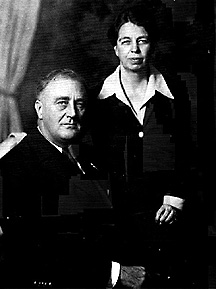
Franklin and Eleanor Roosevelt in 1940.
Eleanor Comes to Campus
The nation’s first lady, Mrs. Franklin Delano Roosevelt, made two appearances on the University of Washington campus early in October. Her first visit was to introduce the famous Russian girl sniper, Liudmila Pavlichenko, to Seattle audiences. The second was to launch a bond sales drive. November 1942
Women Outnumber Men, Even Take Over Sports Page
For the first time since World War I., women outnumber men on the University of Washington campus. Spring quarter registration stands at 2,591 for women, 2,584 for men. During normal times, men outnumber women 60 to 40. … Coeds invaded the sacred field of sports this quarter, as women editors placed their names over the masthead of the sports page of the University of Washington Daily. April 1943 * More than 1,300 cadets will come to Washington on July 1, when the University becomes the site for a branch school under the Naval Training Program…. Under the plan, 12 to 15 men’s fraternity houses on Greek Row will be used to house 700 trainees. The remainder will live in the women’s residence halls. … The Commons will be closed to civilians and used solely to feed Army and Navy trainees. May 1943
Wartime Rose Bowl: Huskies Were Ice Cold
Digging in now for the last and biggest game of their short season, the University of Washington Huskies are preparing for a stiff battle with USC’s Trojans on January 1. The Rose Bowl game comes as a climax to the Husky season of four games which Washington won by wide margins. Plans for a full football season with Northern Division teams were abruptly cut off for the Huskies early this fall when Oregon quite grid conference ball, followed immediately by Washington State, Oregon State and Idaho. December 1943 * Running against a tradition that was so strong it could not admit defeat, the Huskies were overwhelmingly beaten by an inspired Southern California team [29-0]. … The Huskies has not played a ball game since Oct. 30, and in the words of Coach Welch, were “ice cold” on the field. January 1944
Another Type of Bowl Game
Bowling alleys are first on the list of features that University students want to see included in the new Student Union Building, scheduled to be erected immediately after the war. The almost unanimous preference for bowling alleys was revealed in a campus pool conducted by the Daily. April 1944
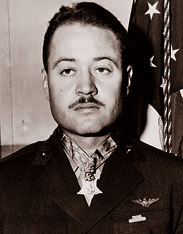
Lt. Col. Gregory “Pappy” Boyington, ’34, stands at attention after receiving the Congressional Medal of Honor in 1945. Boyington, the Marine Corps’ top ace in World War II, wrote a book about his squadron which was the basis for the TV show Ba Ba Black Sheep. Photo courtesy of the Congressional Medal of Honor Society.
War Hero Back from the Dead, Earns Medal of Honor
Major Gregory Boyington last month joined Lt. Col. Bob Galer on the University of Washington roll of men who have won their country’s highest honor—the Congressional Medal of Honor. Announcement of “Pappy” Boyington’s decoration came several months after the Rabaul mission on which he boosted his individual score of enemy planes to 26 and from which he did not return. April 1944 * Just last month, Colonel Boyington came “Back from the Dead.” … Shot down near Rabaul, he was strafed in the water by Japanese planes, finally picked up by a Japanese submarine which happened to surface near him. … Not officially listed as a prisoner of war for reasons known only to the Japanese, and unable to send prison cards to his family at home, Boyington managed to notify his mother that he was alive when a prisoner left the special compound for regular imprisonment. … That was the only word that she had until her son was rescued on Aug. 29. November 1945
Football a Casualty of the War
The loss of 19 lettermen will be a blow to the University of Washington team of 1944. Probably no team with limited material can stand the loss of so many letter-winners and still come up on top of the field. For Coach Welch, it will be like coaching freshmen, since most of the players are in the 17- and 18-year-old class. October 1944
Rolling Your Own in 1945
The “fag” shortage on the campus has resulted in a rash of inventions designed to make “rolling your own” an easy and safe process. Among the better inventions is a “cig-jig” contrived by two graduate students in chemical engineering. A description of it reads like a Rube Goldberg cartoon but the inventors state that a skilled operator can manufacture a plump, well-tailored cigarette with it in 20 seconds flat. January 1945
Racism on the Home Front
“In a war of competing ideologies the question of race has come to occupy a prominent place. Reluctantly we have had to face it, not merely in order to increase the solidarity and effectiveness of the home front, but to counteract the effective use of race as a major weapon by our enemy. … Because even the most obtuse among us recognize that Jim Crowism is hardly a help in this situation, we have taken to using unfamiliar words and practices. As one Negro leader in the Northwest has put it: ‘We Negroes don’t feel quite the same about the war as some of you. We have discovered that only when war comes do you admit that you need us, and needing us, you are ready to grant us the justice that you deny us in peace time.’ … A few months ago a group of Negro soldiers in a typical labor battalion in an army camp in the Northwest asked a morale officer quite bluntly why they should fight for the rights of Czechs and Poles when they themselves were denied rights at home. … On another occasion Negro soldiers from the same post rallied to the defense of a Japanese American who was contesting the legality of certain parts of the evacuation order. The Negroes insisted upon contributing to the payment of the legal fees and collected from their own handful $700. … America may yet discover that the question is not merely one of leadership but rather one of survival. The racism which has produced increasing tension in this country is not basically different from that [of] Germany. … Its incompatibility with the continued existence of the American state, while it is less apparent, is demonstrable. The premise of racism nullifies the very principle upon which the American commonwealth is based.”—Frank G. Williston, February 1945 * “There is no difference in kind, only in degree, between Hitler’s racism and the racism which beats Jews on the streets of Boston, would keep Negroes ‘in their place'” in Texas, or organizes a ‘Don’t Let the Japs Back’ movement in Seattle.”—Joseph Bartlett and Arthur Zuckerman, February 1945
Postwar Rise in Enrollment—and Parking
It has been conservatively estimated that after the war more than 650,000 veterans financed by the Federal government will be taking work on college and university campuses. … It is reasonable to suppose that the postwar enrollment at the University of Washington will reach a level of from 14,000 to 16,000. … The size of the faculty will have to be greatly expanded, and additional administrative, secretarial and maintenance personnel will be required. January 1945 * Harold M. Hines, counselor for men at the University, had good news for our definitely female dominated campus when he reported expectation of 600 to 1,000 discharged veterans to attend classes this fall. This is quite a jump from the 240 veterans registered last winter quarter. October 1945 * The big problem on campus is where to park that car. With more than 12,000 students on the campus, a good number of them driving to school, there is no humor in the problem. It just doesn’t go over very big, this half hour search for a spot. … A student parking lot to be designated at the Pavilion is under motion. April 1946
Debunking Racist Stereotypes
“Many Americans entertain a number of curious and superstitious beliefs regarding Negroes. For example, many suppose that there are fingernail markings which reveal Negro heredity in persons who are predominantly white. Many believe that Negro mouth construction, lips, teeth and palate account for Negro dialect. Many believe that Negro foot and leg bones tend to produce especially good sprinters. Many believe that Negroes have some special racial talent to dance, music or hot jazz rhythms. Beliefs such as these are racist beliefs and are entirely lacking in scientific support. … The belief in the hereditary mental inferiority of so-called Negroes is so old and so widespread in the United States that every educator and informed person is under a profound obligation to explain clearly the scientific evidence on this matter. … This evidence proves that no population is hereditary superior or inferior to any other populations. It proves that the Negro is our potential equal in every respect.”—Anthropology Professor Melville Jacobs, May 1946

The first medical school dean, Edward Turner (left), and the first dental school dean, Ernest Jones, survey Health Sciences Center construction. File photo.
Here Come the Doctors
With the appointment of Dr. Edward L. Turner, former president of Meharry Medical College, Nashville, Tenn., as dean of the medical school, the organization of the medical and dental schools of the University will be started soon. … Upon the arrival of Dr. Tuner, intensive work will be undertaken in order that both the School of Medicine and the School of Dentistry may be opened as soon as space and faculty employment will permit. October 1945 * The bulk of the medical school appropriation will go for construction of the Health Sciences Building, which will house the schools of medicine, dentistry and nursing and a 400-bed hospital. The proposed building will be located on the southern part of the campus occupying a portion of the University golf course. January 1947
Atomic U
Experience gained in developing a torpedo exploder during the war netted the Applied Physics Laboratory of the University a definite role in the recent atom-bomb experiments carried on at Bikini Atoll. … The laboratory designed, manufactured (with the aid of local naval establishments), and shipped several types of instruments to measure pressure as a function of time resulting from two atom-bomb explosions. October 1946
University Enrollment Reaches All-Time High
The all-time peak enrollment of 15,594 students is 4,489 higher than the previous peak which occurred in 1938. … It should be pointed out that 9,699 are veterans. January 1947 * According to the most Registrar’s most recent report, 71.1 percent of the students enrolled at the University of Washington are men and 28.9 percent are women. … Between 1919 and 1941, the percentage of male students varied from a minimum of 56.9 percent to a maximum of 62.7 percent. … Most of the male students are veterans. April 1947
Egging on the Author of The Egg and I
“I know that my ‘outrageous’ success has been very galling to some writers who feel, and probably rightly so, that their books are far better than mine and cannot understand why theirs only sold a few thousand copies and The Egg sold over a million. … Certainly when I was crouched in my kitchen on Vashon Island writing The Egg I didn’t dream that I was oozing out a best seller. The most I hoped for was to get the damn thing finished and published so that I wouldn’t have to move off the Island because I had told so many people on the ferry that I was writing a book. … George Savage … told me that if I made a great deal of money and spent it freely I would be called a show off—a try-to-be-grand. If I made a great deal of money and saved it, I would be called stingy and a miser. He said that I would encounter envy and jealousy where I lest expected it and instead of getting my feelings hurt I should learn to brace my feet and let the blows glance off. I have tried and tried but … I still cannot understand why people will crawl for miles over broken glass just to tell me how hideous I look.”—Betty MacDonald, Fall 1947.
Vets Crowd Ever Corner of Campus, Building Boom Begins
Construction has hit its full stride in the $21.5 million post-war building program which, this biennium, will double the floor area and increase by 60 percent the cubic footage of useful space at the University. … The building needs … have been highlighted the past two years as the great influx of veterans, coming to the University under the GI Bill of Rights, has crowded every corner of the campus. … One building already completed is Charles Church More Hall … Next to be completed is David Thomson Hall … The huge new Health Sciences Building will be one of the finest medical training centers in American … Also under construction are Electrical Engineering, the Administration Building, the Art Wing of the Fine Arts Building and additions to the Library, Johnson Hall and the Physics Building. Winter 47-48.
Having a ‘Hec’ of a Time
At half-time a hush fell over the crowd, then suddenly it changes into a mighty ovation with 12,000 fans cheering wildly as “Uncle Hec” strolled slowly to the center of the floor. After the band played “Bow Down to Washington.” Rusty Calle, ASUW prexy; Dr. Allen, University President; and Harvey Cassill, director of athletics, …officially dedicated the athletic plant as the “Clarence S. Edmundson Pavilion.” Winter 47-48

This 15-kiloton nuclear blast took place in Nevada in 1953. Photo courtesy of U.S. Department of Energy.
Bikini Blowout: Fish Experts Study a Blast
The most spectacular honor came to the University when the Atomic Energy Commission and War and Navy departments chose the Applied Fisheries Laboratory to coordinate almost all federally supported research on the effects of radioactivity on marine life. … Lauren Donaldson and some of his staff members were present at the Bikini “Operation Crossroads” experimental blast as Navy observers in 1946. * While detailed results may not be disclosed, it has been revealed that the rays have had a definite effect on reproductive processes and growth. Defects have been noted also in blood-forming tissues. In the first generation, numerous deformities and damaged nervous systems were found. Summer 1948
Canwell Hearings Weren’t a ‘Witch Hunt’
A large majority of the American people want to know the facts about the Community Party and its membership. … If we fail to obtain our facts in this legal way, we may find them later and less happily as have the people of Czechoslovakia and other nations of Eastern, Central and Southern Europe. While the procedures followed by the Legislative Committee doubtless could have been improved in some particulars, it is apparent that an honest effort was made to bring to light necessary and pertinent facts. No honest man with a clear conscience about his political activities and affiliations need have fear of the committee’s questions. Those who have been disposed to label the hearings a “witch hunt” are either unaware of, or have chosen to disregard, the fact that the hearings did not degenerate into indiscriminate charges against any faculty member who may have at one time or another happened to disagree with the political philosophy of the committee members. It is a credit to the committee that it did painstakingly avoid the smearing of honest and sincere liberals with a red brush. Summer 1948
1950s
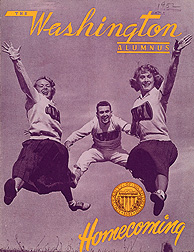 The Secret of Survival under Atomic Attack
The Secret of Survival under Atomic Attack
“Filling a request from companies and organizations, Frayn Printing Company is making available an official U.S. Government booklet presenting the secret of survival under atomic attack. The 30-page booklet is replete with information which a number of Seattle organizations have already made available to employees and their families. One of our largest industrial firms ordered 35,000 of the booklets. The cost is very nominal, and orders may be in any quantity of 500 or over.”—Frayn Printing Company ad, Spring 1951.
Progress at the Expense of Natural Beauty?
“I am writing to protest in the strongest possible terms the destruction of the beautiful wooded area in the northwest corner of the campus to make a parking lot for students’ cars. … The parking problem in the district is a serious one I realize; this is a new age and we must have progress—agreed. But surely not at the expense of destroying the last remaining area of natural beauty.”—Letter to the Editor by Dagmar Georgeson. * “A major reason for approval of the new lots is to help solve the congested University District parking situation. … The Board of Regents and the University administration are conscious of their obligation to retain the beauty of the campus. They feel that the new parking areas will not detract from the appearance of the campus, and that further, the University has a responsibility to its students to provide them with adequate parking facilities.”—Board of Regents President John King. Fall 1951
Reviving Faith in Free Society during Cold War
“We have not made much headway reviving faith in free society. … If this is to be a cold war for many years as Allied diplomats believe, then the attitudes of the French, Germans, Italians and all the rest will be decisive. … It is inescapable to anyone who visits Europe that democracy and the ways of free men are on trial. We may lose if we permit arrogance and self-righteousness to dictate our foreign policies; if we countenance corruption and moral laxness in government; and if we are complacent in the face of social and civic irresponsibility and intolerance in our communities.”—Ed Guthman, ’41. Spring 1952.
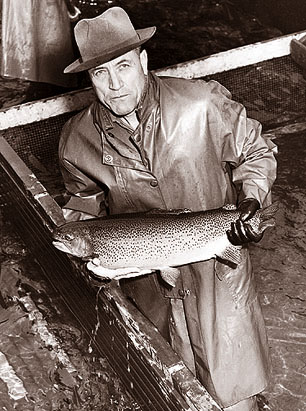
Fisheries Professor Lauren Donaldson holds a salmon returning to the UW salmon pond. File photo.
A Fishy Homecoming
An unusual group of University of Washington alumni had a Homecoming all their own down a the Fisheries Building this fall. … A group of college-bred silver salmon, released from a concrete pond on the campus a year and a half ago, returned to their artificial spawning grounds. … Although it has long been known that fish will return to natural spawning grounds, this is the first time on record that any have returned to an artificial environment. …Lauren Donaldson, professor of fisheries, pioneered the experiment despite the skepticism of other fisheries experts who said it couldn’t be done. Winter 1952-53
UW Starts Its Own TV Channel
Educational television is one of the major questions that has been plaguing University administrators and educators in recent months. And they’ve decided `tis better to meet the challenge than to forfeit all chance to obtain such as station in Seattle, with its many new possibilities for the education of students and adults. So the University applied for Channel 9 in time to meet the June 2 deadline. … The decision to enter the television picture was not an easy one to make … An outside consultant… indicated that an educational station could be operated within reasonable financial limitations. Summer 1953.
Men Finally Have a Home on Campus
A fabulously beautiful new building was added to Washington’s lovely campus recently when the first of two permanent men’s dormitories opened its massive glass doors at the beginning of Fall Quarter. … The opening of the Men’s Residence Hall marked the end of a 36-year period during which the University did not offer housing for men in permanent structures. The new 12-story campus skyscraper replaces temporary war-surplus barracks accommodating bachelor veterans after World War II. Winter 53-54 * The “Hero Halls” for bachelor veterans, which cluttered the area around Frosh Pond, have been torn down. The grounds are being landscaped attractively, and you can actually see all the way from Bagley Hall to Guggenheim Hall. [Name changed to Terry Hall in 1957] Spring 1954
Pleading the Fifth
University of Washington Faculty Senate members take a dim view of educators who invoke the Fifth Amendment. In a recent action, the Faculty Senate agreed overwhelmingly that hiding behind the Fifth Amendment casts heavy doubt on the fitness of an educator to hold a teaching position. The faculty representatives voted their approval of a policy that it is proper to re-examine the tenure of any professor who refuses to answer questions from a legally constituted government body. Summer 1954
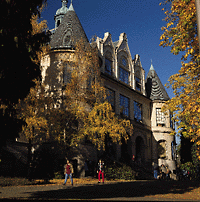
The oldest building on campus is Denny Hall.
Razing Denny Not an Option
Denny Hall, the first building constructed on the UW campus, will be remodeled instead of torn down. The action was taken after a new and detailed study of the structural condition of the 60-year-old building was made by a board of engineers and architects. The new study was ordered at the last meeting of the regents when it was suggested that it might be better to raze the structure and replace it with a new building. Fall 1954
Enrollment Boom Projected into 1960s
The autumn quarter registration was 13,675, and increase of 627 over the previous autumn. … A new 10-year forecast indicated that all state school enrollments will continue to break records every year until at least 1965 and probably beyond. Sample projections are 14,050 in 1955; 15,400 in 1957; 17,000 in 1960, 19,500 in 1963; and 21,800 in 1965. January 1955
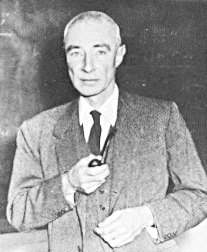
Physicist J. Robert Oppenheimer was rejected as a possible lecturer by UW President Henry Schmitz, causing a firestorm of criticism. At least one international science conference canceled plans to meet on campus.
Disinviting Oppenheimer
A few months ago President Schmitz decided not to invite to the campus a controversial physicist [J. Robert Openheimer, leader of the Manhattan Project, whose security clearance was revoked in the 1950s] whom the Physics Department had recommended as a Walker-Ames lecturer. A series of misrepresentations … and the premature and partial reporting of the matter in the press unfortunately thrust the University into the national spotlight. The ensuing refusal by certain scientists to come to Washington as guest lecturers further clouded the issue. … It soon became clear that it was not so much a question of whether the decision was right or wrong, but whether Dr. Schmitz had the right to make a decision such as this. … The Alumni Association, having considered the issues, is convinced that academic freedom is not involved and that the basic issue is one of University administration and authority only. … In the final analysis Dr. Schmitz, as President of the University, is the voice and direct representative of the people of the State of Washington. As such he is vested with their authority to make any decision he deems proper. April 1955
Employment Boom—Which Job Should I Take?
Those of us who remember the job prospects during the Depression look with awe and envy at this year’s graduates. … In many fields, it wasn’t a question of “Will I get a job?” Rather, it was “Which job shall I take?” Engineers, chemists and physicists were in the best spot. Their offers ranged from $350 to $500 per month. Stating salaries for non-technical graduates ranged upward form $300. July 1955
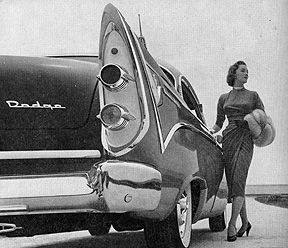
Push-button transmission was hailed as a breakthrough in automotive technology in this Dodge ad that ran in the magazine in the 1950s.
Life is Better in a Dodge
“Push-button driving, the `dreamers’ vision of years back, has become a reality in the ’56 Dodge. Four push-buttons on the dash, as easy to operate as those on a radio, allow the driver to select instantly the desired driving range from his automatic, Power-Flite transmission. Gone is the gear shift as we knew it. … Many, many steps, some little and some great, will be taken toward the eventual end that the automobile will do more of the work, the driver less. … The almost entirely automatic car? Gas turbine engines? Atomic power? Probably all in their time. But I cannot give you the timetable, only our direction, which is always forward.”—William C. Newberg, ’33, president, Dodge Motor Division. October 1955
Football’s Sins Punish All Sports
[A league investigation finds that 27 football players are getting payments from boosters averaging $60 a month. As a result, all UW sports programs are penalized.]
Since May, when the Pacific Coast Conference aimed a two-year probation at Washington, University alums and the rest of the public have raised a lot of vital questions. Will the school de-emphasize football? … Has the penalty affected the recruiting program? Will the football squad suffer morale-wise because it can’t go to the Rose Bowl? … George Briggs, the University’s new athletic director … is confident the Huskies will come out of the probation … sound of life and limb. … Briggs and each member of his staff share the belief that the penalty was unjust as it pertained to athletes in other sports than football, but each, too, shares the thought that—as painful as it may seem at the time—the University’s athletic program can emerge stronger than ever. July 1956
Enrollment Pressures Mounting
The 1955 enrollment approached 15,000 despite specific curtailment of out-of-state registrations. An increase of more than 50 percent is possible in the next eight years. The University is now expected to have 18,000 students by 1960, 23-24,000 by 1965. … During the next 20 years the state population is expected to grow by 35 percent while during the same period of time the college-age population is expected to grow by 80 to 85 percent. October 1956
The End of the Pacific Coast Conference?
“Question: Has the UW, as one of the schools most heavily penalized in 1956 for rules infractions, sought to break up the Pacific Coast Conference? Answer: No, quite the contrary. From the beginning the University has accepted, without public complaint or rancor, its responsibility for past dereliction in the operation of its athletic program and has carried forward, vigorously and successfully, a program of rehabilitation and correction. Question: Can the conference survive now that California, UCLA and USC have declared their intention to withdraw? Answer: It can, but the problems of survival seem to be almost insuperable.”—Professor Donald Wollett, faculty representative to the PCC. Winter 57-58
A New President Arrives
Dr. Charles E. Odegaard will come to the University as President next August 1. Dr. Odegaard is dean of the College of Literature, Science and Art at the University of Michigan. … Dr. Odegaard, 47, is considered one of the outstanding younger educational administrators in the nation. He was the youngest dean ever to head the literary college at the University of Michigan when he was appointed to the post in 1952. His major field of teaching interest is medieval history. Spring 1958
Crew Beat Russians in Moscow
“Coxswain John Bisset raised both arms skyward in a gesture of sheer ecstasy as the slim prow of a rowing shell slid across an imaginary finish line. This expressed more adequately than a thousand words the sentiments of Washington oarsmen, their coach, the American Ambassador to Russia, and a handful of Yanks tonight at the shocking defeat of Leningrad’s world’s championship eight.”—Seattle Post-Intelligencer Sports Editor Royal Brougham. Summer 1958
Columns Collapses
Old-timers sighed nostalgically, the University administration sighed with relief and most students didn’t even bother to sigh when Columns, the monthly humor magazine, was abolished this spring. The demise was inevitable. After many years of ups and downs, Columns had been on the downgrade steadily for the past 10 years. Producing a magazine of satire and humor just didn’t seem to interest post-war student journalists. Summer 1958

Nurses in traditional uniforms use the entrance to the new University Hospital. Photo courtesy of Health Sciences/Medical Affairs News and Community Relations.
University Hospital Opens Its Doors
Today the hospital stands completed—the complement to the excellent basic facilities of the Health Sciences Division. … Although the hospital appears similar to most community hospitals form the outside, its design and function is considerably different because it has a different job to do. … Each floor contains special facilities for students, interns and residents participating in the care of patients. … The hospital will be a training center not only for medical students, but for 14 allied heath-care professions. … It is estimated that about 60 percent of the cost of operating the hospital will be met by patients’ fees. Spring 1959
The Arctic Goes Nuclear?
A team of UW scientist has gone north of the Arctic Circle to conduct a month-long ocean survey of a remote Alaskan coastal area that may become the site of the first use of nuclear explosion for peaceful purposes. The University group will be in charge of the marine phase of a $1 million land-and-sea biological study of the Chukchi Sea region. … The survey is basic to the U.S. Atomic Energy Commission’s proposed Project Chariot, a project that would involve the simultaneous explosion of five nuclear devices to blast from the Alaska tundra a new, far-north harbor with channel and turning basin. Summer 1959
1960s
First Rose Bowl Victory
The grand-daddy of the bowls—the magnificent and impressive Rose Bowl—saw the first Coast Conference victory over the Big Ten as Washington shellacked Wisconsin 44-8. … The estimated 25,000 people who traveled south from the State of Washington to view the Pasadena proceedings was by far the biggest exodus from an outlying state in the history of the game. Spring 1960.
Computer Power
A high-speed electronic digital computer, purchased recently by the UW for its new Pacific Northwest Computer Center, will be replaced by a faster and more efficient machine. … A major feature of the IBM 709 is that it is more versatile than the 704 and has a core memory four times larger than would have been provided by the 704. … The 709 computer will be the first of its kind to be installed on a university campus in the western United States outside of California. Summer 1960
Enrollment Boom
During the 1961-63 biennium, the University of Washington enrollment is expected to increase at the rate of 1,000 students per year. By 1970, the University’s enrollment could reach 30,000, almost doubling in size in a single decade. October 1960
Taking the Measure of Jack Kennedy
“Kennedy will bring a different concept of the Presidency to the White House. Instead of relying on a huge staff and much delegation of authority, Kennedy will be in the center of action. He sees the Presidency as the centripetal force in our national government. I would expect great intellectual ferment of ideas and discussion without radical innovations. … This new President will probably call for new goals and sights after the comfortable, tranquilizing ’50s. Whether people will respond is problematical.”—Political Science Professor Hugh Bone. January 1961

President John F. Kennedy and UW President Charles Odegaard pose prior to a convocation celebrating the 100th anniversary of the University of Washington. Photo by James Sneddon.
Kennedy Comes to Convocation
Eleven thousand students, faculty members and special guests crowded the Edmundson Pavilion as excited spectators of one of the greatest events in the University’s history: the Academic Centennial Convocation marking the climax of the University’s first century. … The loudest applause was justly reserved for the man who had come all the way from Washington D.C. to deliver the Centennial address—President John F. Kennedy. In his stirring and much quoted speech, President Kennedy, after paying tribute to the University and its achievement, moved to the present world crisis and spoke eloquently of the need for wisdom and moderation.
“In 1961 the world relations of this country have become tangled and complex. One of our former allies has become our adversary, and he had his own adversaries, who are not our allies. Heroes are removed form their tombs, history rewritten, the names of cities changed overnight. We increase our arms at heavy cost primarily to make certain that we will never use them. We must face up to the chance of war if we are to maintain the peace. We much work with certain countries lacking in freedom in order to strengthened the cause of freedom. … And as the most powerful defender of freedom on earth we find ourselves unable to escape the responsibilities of freedom and yet unable to exercise it without restraints imposed by the very freedom we seek to protect.”—President John F. Kennedy, January 1962
The World of Theodore Roethke
Roethke’s artistic and academic stature is matched by a physically imposing figure. Now 53 years old, he is over six feet tall, weighs upwards of 180 pounds. There is something distinctively bearish about him—his frame; his gait; the way he occupies a chair, combining a loose-limbed slouch with an animal alterness, one moment in comfortable repose and the next moment nervously pacing the room to quote a favorite poem or fetch a book from nearby shelves. Penetrating eyes are set in a remarkably plastic, almost amorphous face (it has been likened to Charles Laughton’s)—a face which can reflect simultaneously exaltation and despair, profound sensitivity and an unmistakable hint of pugnacity. Spring 1962
Growing Pains
Since the University of 1962 cannot build a new campus in the deep woods, as it did in 1861 and again in 1895, where can it find the space it needs for continued growth? … The campus can’t expand, at reasonable expense, north into organized student residences, or west onto “The Avenue.” East is Lake Washington and south is Lake Union. However, to the southwest is an area now being studied by the City of Seattle to determine its possible qualifications as a federally supported Urban Renewal project. Whether the University, through federal-community agreement, can grow into this area at relatively moderate cost will soon be decided. Summer 1962
Racial Segregation in Seattle
“In Seattle, as in all large American cities, the Negro population shows a marked degree of spatial segregation. This pattern of residential segregation is also manifested by other minority racial groups. In the development of Negro residential segregation patterns in the large city, the prejudice of the dominant white group, internal cohesion, and the comparatively low economic status of the Negro are particularly important factors.”—Sociology Professor Calvin Schmid, October 1962
Enrollments: We Who Benefited Must Provide For Future
The approaching tidal wave is of such proportions the University cannot offer present levels of service to the large new enrollments without dramatically increased support from the people whose children, and grandchildren, are the tidal wave. We who have inherited the past must provide for the future. With the enrollment projections before us, it would be a crime of great shame if we, the people of the richest generation of the richest nation in the history of the world, failed to provide as well for the students of the future as the rough-hewn frontiersmen in the “little clapboard cabin” provided for us. October 1962
Man is Young and Imperfect
“There seems no chance that any other organism will supplant man as dominant type. Granted that man does not destroy himself by some nuclear idiocy, the, according to the geophysicists, he has at least as much time before him as he has behind him, all the way back to the amoebae and beyond. And do not let us forget that man is extremely young. He is young not only in terms of millennia on the evolutionary time scale, but also in the sense that he is not yet fully human. We have to plan for the full humanization of man. As a new dominant type, he is still very imperfect, and so area all his cultures and achievements, including our own.”—Sir Julian Huxley, Fall 1963.
Cracks Behind the Iron Curtain
“The quarrel in the Communist bloc between the two great prima donnas, Khrushchev and Mao Tse-tung, is of utmost importance to us in the free world. … It is futile to wait for a break in the Communist bloc as a result of the conflict or of a disintegration of that bloc into different units, eve if the present conflict should lead to an open split in the movement. It seems to me entirely unrealistic to try to “wean away” (as the term goes) one of the Communist leaders from the other and join up with him. These ideas disregard the importance of Communist doctrine, the unity of the Communist bloc, and the overall purpose of Communist policy, which is our defeat and Communist victory.”—Professor Franz Michael, Fall 1963
Regents Allow Students to Invite Outside Speakers
The board decided that the wisest course to meet the situation was to adopt a program which permits students to invite speakers of their choice to campus under conditions where the speaker’s ideas would be exposed to the critical analysis especially appropriate to the University setting. … If, in the opinion of the faculty general chairman, the speaker at any time during the meeting either incites his audience to riot, or advocates the overthrow, destruction or alteration of the constitutional form of the government of the United States, or of the State of Washington, or any political subdivision of either of them by revolution, force, or violence, the faculty general chairman shall immediately take the chair and adjourn the meeting. Spring 1964
“We Will Be Cursed for Our Stupidity”
“As each era recedes into history, it is judged by its successor, and then judged again by its successor. … The next period will certainly be as destructive to us as we have been to our immediate past. … In the coming age of atomic energy we will be cursed for our stupidity in blocking up fine rivers with dams in the name of cheap power. … A rather extraordinary thing happens to the sensitive visitor who walks through museum halls. … He sees a Venus with a clock in her belly, smiles, and remarks, ‘What a fantastically vulgar period that was!’ Yet that same visitor bought a two-tone car in 1950, buys ‘Golden Books’ for his children, and lives in a plywood house where the plasterboard walls tend to crack while the cement-block foundation settles. And he and his brothers happily sold grandfather’s hand-crafted house to a developer who immediately tore it down and in its place put up eight ranch houses on quarter-acre lots.”—Burke Museum Director Walter Fairservis Jr., Spring 1965
Students Don’t Want a “Berkeley Situation” at the U
“Most students do not want a Berkeley situation at the University of Washington, but they do want some changes and they are speaking out. … Some thoughtful students direct the attack not at the temporary and minuscule problems generated from attending college but at the Establishment—society itself. ‘You’ve had your chance to right the world’s wrongs,’ they tell the Older Generation, ‘and you’ve muffed it. Now we can’t afford any more mistakes.’ And then they hoist picket signs and demonstrate in front of the Federal Building against imperialism in the Dominican Republic or the war in Vietnam. Or they march south to destroy the still solidly entrenched unequal rights society. No one is immune to their attacks. A student called Martin Luther King a ‘fink’ because he was unwilling to move faster on civil rights demands.”—Former Daily Editor Tom Beell. Summer 1965
Good-bye to the Old Meany Hall
The building had long ago outlived its usefulness. The second balcony has been closed for several years and following last April’s earthquake, when plaster crumbled and some of the wooden columns holding up the building shifted position, President Odegaard ordered an independent engineering study. … The report was ominous. According to the engineers, the possibility of another earthquake made Meany unsafe for public gatherings. …The building’s demolition [was] completed before school started. The area is now being landscaped while plans for a replacement are being studied. Fall 1965
Civil Rights Marchers as Heroes
“We have a situation which provides a vehicle for contemporary idealism. It is, of course, the problem of race relations which has been swept under the rug for a 100 years. Given the particular conditions in our country, the heroic roles are being played by persons who have participated in the civil rights movement in Alabama and Mississippi, those who have been on the site fighting for desegregation. From the university’s generation’s point of view, the hero is the one who is saying: ‘Let’s not sweep this under the rug anymore. Let’s focus attention on it; let’s get it out in the open.’ The hero is the civil rights marcher in the South. … The expression of idealism for this generation is taking the form of participation in the civil rights cause, or increasingly in the Vietnam problem.”—President Charles Odegaard. Fall 1965
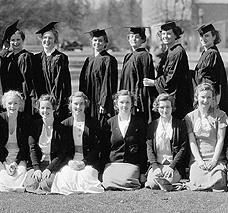
Women in the 1933 Mortar Board society pose on campus. File photo.
The Place for Women
There was a time when it was widely believed—rightly or wrongly—that most women attended the University primarily to achieve a goal not listed in any curriculum, and if in the process they gained a degree, that was pure gravy …Degrees and husbands are now equally valued by the “second sex.” … The data show that the proportion of men to women receiving the baccalaureate as 2:1 in 1960, but declined to roughly 1:1 in 1965. Spring 1966
LSD Arrives
Students and a number of faculty were involved in one of the hottest controversies of the year, the use or misuse of LSD. … LSD is difficult to deal with because of the absence of controlling legislation, because few people know much about the drug, and because it is easily made and is tasteless, odorless and colorless, making it hard to detect. Medical experts agree it is not habit-forming in the usual narcotic sense, but they point to other, more dangerous effects. … University officials believe few students have actually tried LSD—coverage by the media to the contrary. Summer 1966
A Different Kind of Campus Cramming
A new all-University room-cram record was established when Rainier House of Terry Hall packed 220 people into 175 square feet of floor space. Coeds from Dotson, McLean and Cypress Houses assisted. The Terry Hall head resident, who chaperoned, commented, “There could easily have been room for four or five more.” Fall 1966
Equal Hours for Women?
Of more than 26,000 students, all have been free to set their own hours except 2,500 freshmen, sophomore and junior women under 21 and living in University residence halls, sororities and religious living groups. … At this university, as throughout America, women have been asking wit rising urgency for equality of hours. … Dean of Students Donald K. Anderson … envisioned giving all women the right to set their own hours, regardless of age or academic standing—and without written permission from the parents. … President Odegaard then reviewed the recommendation; his decision made a Daily headline: “Coed Curfew Ends.” Washington is the second major institution to eliminate all closing hours—the first being UCLA. Spring 1967
The Spring Before the Summer of Love
During May, a pleasant UDM [University District Movement]-hippie happening called “Gentle Thursday” occurred weekly—often on other days of the week as well. Dozens or scores of Gentle Thursday purveyors appeared in beads, beards and bright clothes; passed out free candy, cookies, marbles, incense sticks and more; with chalk drew bright, strange pictures and messages everywhere (“Love is a four-letter word.”); flew rubber-band airplanes and fragile kites; blew multihued bubbles; and distributed thousands of free daffodils, tulips and roses. Summer 1967
Draft Cards Burned
At the annual Governor’s Day review of UW ROTC troops, anti-war demonstrators were refused admittance for their signs; subsequently they shouted, waved flags and threw flowers, created a minor uproar. Two young men burned their draft cards, one student was arrested for disturbing the peace and for obscenity. Summer 1967
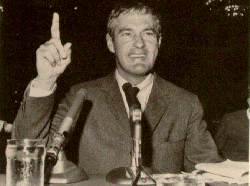
Former Harvard Professor and LSD advocate Timothy Leary testifies before the U.S. Senate in the late 1960s.
Where to Go When You Want to ‘Drop Out’
LSD guru Tim Leary named three good places to go when you “drop out—Haight-Ashbury, the East Village in New York, or (are you ready?) our own University District.” The closure of the Avenue coffee houses which served as social clubs during the first years of the Hippie Era … gave Seattle in summer 1967 a new tourist attraction on the lawns north of Parrington Hall. Hippie Hill it is now called, for the group found there any good day and many a bad night, wearing strange and wonderful clothing and hair, picnicking, strumming guitars, singing or simply sprawled under trees talking. Fall 1967
Planning for “Suzzallo Quad”
The Architectural Commission just recently approved preliminary plans for three new buildings whose presence will define a key area still undetermined: the space to the west of the Library, Suzzallo Quad. …Planning proceeded on the new Quad and three buildings of its complex: a lecture-auditorium building, a performing-arts center, and an undergraduate library. Fall 1967
Freeways vs. Mass Transit
“The contemporary freeway is much maligned by a small but vocal segment of our society on the basis of its physical appearance, removal of historic structures, elimination of dwelling units, and general impact on the cityscape. A similarly small percentage of our citizens sing the praises of the freeway and are oblivious to its faults. Perhaps the largest group of us simply view the freeway as substitution of one type of a road for another, with improvements in access control, safety, and time-saving features. … As an urbanist … I feel it is unfortunate that support for mass rapid transit has not at least paralleled that for freeways, in order to provide the opportunity for differing forms of urban living and travel.”—Civil Engineering Professor Edgar Horwood Fall 1967
 Sgt Pepper—The Great Rock Album Ever or a Dazzling Fraud?
Sgt Pepper—The Great Rock Album Ever or a Dazzling Fraud?
The latest Beatles album is a controversial one; Sgt. Pepper’s Lonely Hearts Club Band is even father out than its predecessors, a sensory surprise package. … One piece stands out form the rest—”A Day in the Life,” a five-minute, three-movement symphony , mixing a string orchestra, an electric piano, crashing drums and a huge vacuum cleaner (that’s the sound, at any rate) the incredible, solipsistic images and John Lennon’s ultra-sad voicing. Assessment of Sgt. Pepper are a varied as the album: “the greatest rock album ever made,” “one long LSD trip,” and ” a dazzling fraud” are typical responses. Fall 1967
Race in 1967
“Many Negroes fully qualified to succeed academically could be here on campus, if they believed they could succeed, and if they believed the door was truly wide open. And their presence in greater numbers would loosen the uptightness of well-meaning whites, and this in turn would relax the Negroes, and this in turn would lead them to encourage others to come. In large part the problem is that of a subcritical mass, Negro students being too few to sustain a chain reaction of mutual inter-racial education.”—Washington Alumnus Editor Harvey Manning, Winter 1967-68
Vietnam—The Tie that Binds
“The Vietnam War … is, in my judgment, the greatest single factor creating unrest in America today. … It is Vietnam that provides a nation focus for unrest, a cohesiveness of national dissent that spills over into other areas. I am not suggesting a change of direction, but am merely reporting to you that much of the student emotion that runs through our colleges and universities is attributable to the views held by some young people on the Vietnam situation.”—Vice President for University Relations Bob Waldo, Spring 1968
Drug Fad Washes over UW Campus
The UW is no more exempt from the current drug fad than any other American university. Just how “turned on” the campus actually is, no one knows. … Guesses on the proportion of students experimenting range from as low as 5 percent to as high as 75 percent. Spring 1968
Race in 1968: “No One Likes What He Sees”
In this spring of 1968, with President Lyndon Johnson warning us the coming summer will be longer and hotter than that of 1967, optimism is hard to come by. Perhaps no black man or white man who sees clearly into the future of race relations in the nation, the State of Washington, the City of Seattle—or the University of Washington—likes what he sees. … The University can bring black students to campus and help them stay, it can provide minority employees with expanded opportunities for career growth, it can serve the Central Area with special resources of knowledge. yet these are small nibbles at the big problem: that the University is a part and parcel of a society that continues to deny some of its citizens full and equal opportunity for individual development.”—Washington Alumnus Editor Harvey Manning, Spring 1968
Days of Protest and Resistance
The UW Vietnam Committee and the Students for a Democratic Society put forth their major effort on April 21-27, the April Days of Protest and Resistance. Though the event did not live up to the expectations of the promoters (in particular, a “strike” of 2,000 students and 50 professors, reported in the press as actually happening, remained an unfulfilled hope), the week was lively enough. … Thursday the University was indicted at a Mock War Crimes Trial for complicity in the Vietnam War and for Racism. … Saturday the April Days concluded with the largest peace demonstration in the history of Seattle, a march from downtown to a rally at Seattle Center attended by an estimated 2,000-3,000 people. Summer 1968
Administration Building Sit-In
At 5 p.m. May 20, a body of students bearing bedrolls, soda pop and a phonograph descending upon the Administration Building, determined to spend the night if their demands were not met. … As the meeting proceeded behind locked doors, in the outer offices discussion went on between students and University officials pondering their course of action. This was highlighted by the scene of students scaling the façade of the building to gain admittance after it was sealed off. At 8:45 p.m. the sit-in abruptly ended with a statement issued by the mediating faculty and administrators, pledging to continue to finance a recruitment campaign and develop a Black Studies program. November 1968
Not the Same University
It was not the same University which greeted students when Autumn Quarter rolled around Sept. 30. What a difference a year made. … Statistics alone tell a story. The number of Afro-American, Mexican-American and American Indian students on campus has swollen to nearly 500, considerably more than a 1967 educated guess of 180. … In mid-September [came the] unveiling of the much discussed Black Studies program. … Four courses of interest to black students were already on the autumn schedule—Afro-American History, Philosophy of Racial Conflict, Jazz Ensemble Workshop and Black Literature. November 1968
Homecoming 68: Parsley, Sage, Rosemary and Thyme
This year Homecoming has got to be an even bigger, better happening than last year. … Those who really want to relive their school days can join the students listening at 8 p.m. in Edmundson Pavilion to Simon and Garfunkel, singers of The Graduate fame. November 1968
Enrollment Records Broken Again
The enrollments for both Summer Quarter and Autumn Quarter topped last year’s record. … The increase in Autumn enrollment is estimated at 32,000, about 6.6 percent more than last year’s 29,977. November 1968 * For the first time in its long history, the UW, now the largest single campus educational institution on the West Coast, contemplated limiting its enrollment by setting a ceiling of 32,500 students. … At the same time the Board of Regents raised the quarterly resident tuition and fees $18 to $133. July 1969
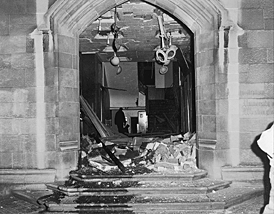
The main entrance of the Administration Building on the morning of June 29, 1969, shows some of the $300,000 worth of damage. Photo courtesy of UW Special Collections.
Administration Building Bombed
The blast … shook the University District out of bed at 3:30 a.m. June 29. An estimation by police at the time said the explosion had a force equal to two boxes of dynamite. First arrivals to the scene found the main floor of the Administration Building in shambles. Through a gaping hole four feet in diameter in the steel-reinforced concrete entry alcove, they could peer down in the the Graduate School conference room on the floor below….Forutnately no injuries occurred. … President Odegaard termed the “senseless destruction” as “an act of vandalism that defies understanding.” September 1969
Greeks, ROTC Feel Changes
There was a considerable drop in the number of men pledged to fraternities this fall. The 611 pledged were down 170 from last year. The IFC advisor attributed the drop to the “new type of student,” who sees fraternity living as restrictive. Enrollment was down sharply in the campus ROTC programs. Freshmen enrollment in Army ROTC is down 40 percent from last year and similar drops took place in the other services. November 1969
Most Intensive Construction in History
The University has entered the most intensive construction period in its history with more than 20 project under way costing $38 million. … The view out Rainier Vista is not quite what it used to be since the excavation for the Central Plaza began last summer. A 1,000-car parking garage will be underground, with a classroom-auditorium building, undergraduate library and performing arts building circling the plaza. … The Seventies will bring a new law center, psychology building, south campus student center, forest sciences laboratory, health sciences expansion and resident halls. November 1969
1970s
Confusion and Controversy
The 1969-70 academic year may be best remembered for the confusion and controversy which surrounded it. … The University of Washington was not “closed down.” Despite the call from certain groups and attempts at setting up barricade-picket lines, classes met as usual last spring. Classes were suspended only twice—first in memory of the students killed at Kent State University, and again for the two shot at Jackson State. Keeping their cool, students chose to take their issues out into the broader community, although what tends to be remembered, because of the headlines, were the several marches from the campus to downtown and back which stopped freeway and other traffic. October 1970
Racism and Football
The question of racism in the Department of Intercollegiate Athletics rose again this fall as four black football players quit the team at the end of the season. In response to the charge, the Board of Regents and other top University officials conducted an inquiry which led to the following recommendations: “that vigorous action must be taken to ensure that minorities are represented throughout the department. Specifically … that a black administrator must be employed in the department and a black assistant football coach must be employed as soon as possible.”
Of Beards and Revolutionaries
“I am ashamed to be a graduate from a University whose student body would nominate and elect such an evidently dirty, disheveled, long-haired, bearded, left-wing radical revolutionary who should have stayed at Stanford.:—Letter to the Editor regarding ASUW President Richard Silverman. March 1971
Homecoming Debate: Costigan vs. Buckley
Homecoming … with a new format debuts Thursday night, Nov. 11, with a debate between William F. Buckley and Dr. Giovanni Costigan. Set for Hec Edmundson Pavilion, this joint student-alumni function reflects what’s new with Homecoming for 1971. September 1971
Sonny Sixkiller Revives Huskies
The nucleus of the 1972 football squad is a fantastic group of players that started the stunning resurgence of Husky football in 1970. … What they’ve done is take the Huskies from a 1-9 mark in 1969 to 6-4 in 1970, the 8-3 in 1971. … Sonny Sixkiller has been the big spark. The Huskies had been known as a running team until, in the spring of 1970, Sixkiller stepped in, Washington went to the air, and Washington began to win. November 1971
Saying Good-bye to Odegaard
It was “Charles E. Odegaard Day” at the University Art Fair May 11, as proclaimed by Gov. Daniel Evans. Before the day was over, the retiring president of the UW saw a new building on the Central Plaza named the Charles E. Odegaard Undergraduate Library; a bronze sculpture of himself … and a display of student-faculty-administration-alumni camaraderie in the Plaza— quite distinct from days when anger, protest and demonstration dominated the area. June 1973
Vietnam Vets Not Killers
It is the lot of the Vietnam veteran to be guilty by association with a war that was particularly unpopular in an academic atmosphere like that of the University of Washington. … While most of the veteran’s psychological problems revolve around feelings of severe guilt and depression, thee is no blanket solution to their problems. … ” Someone has to help these people see that they’re still people,” Vietnam Veteran Counselor Andy Slatt said, “not some type of killer or anything. Someone has to help them see for themselves that there can be hope on the other side of the alienation and depression.” June 1974
Women’s Sports on the Rise
“At the UW I don’t feel that in order to run an equitable and good program for women it’s necessary to have the same or even half the funding that men’s sports get. It really doesn’t cost the same amount to run good women’s programs. Football is a very expensive sport. There’s not any comparable sport for women,” says Kit Green, “head” of women’s sports. … Next year UW women will have nine sports in intercollegiate competition: Basketball, crew, gymnastics, field hockey, swimming, tennis, track and filed, volleyball and golf. September 1974
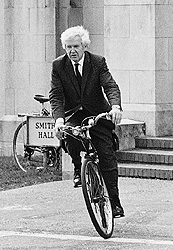
Legendary History Professor Giovanni Costigan rides a bike to campus, a habit he continued until shortly before his death in 1990. File photo.
Costigan a Campus Cause Celebre
Giovanni Costigan, the UW’s famed scholar of English and Irish history, still a familiar campus landmark as he rides his three-speed bike to work every morning, has also become a campus cause celebre—because he has reached the mandatory retirement age of 70. Students who have found inspiration in his classes have “got their Irish up’ and are determined not to let him slip quietly into history. The have formed a “Committee to Retain Giovanni Costigan.” April 1975 * History Professor Giovanni Costigan … will return to campus next fall to teach again—this time under the auspices of the UW Alumni Association.. As a private, independent entity not within the formal framework of the university, the alumni association was able to do what the University could not do; engage Costigan to conduct two non-credit courses. Summer 1975
DJ Arrives
Challenges are nothing new to energetic Don James, who assumed command of Washington’s football program eight days before his 42nd birthday. … “I was honored with the offer,” said James, “and accepted the job with every intention of molding the finest football program at Washington that is humanly possible. The Huskies have had a great football tradition over the years which has been respected nationwide. We’re eager to perpetuate those high standards.” Summer 1975.
Bicycles Are “In.”
Cars are “out.” Bicycles are “in.” The bicycle, that once scorned, heavy, fat-tired-n-fendered antediluvian conveyance, fit only for kids and paper routes, has seen a remarkable rebirth in the last few years. Nowhere is that more apparent than on the UW campus. … The J.C. Higgins has metamorphized into the sleek, skinny-tired, stripped down “Ten-Speeds” that are used by ecological, economical and exercising people everywhere. Summer 1975
Rose Bowl Victory
A rosy glow spread over campus at the start of Winter Quarter as the huskies, 14 years from their last Pac-8 Championship, crowned it by bringing home the roses. “The Dawgs,” who had gone into the Rose Bowl as 13-point underdogs, can out as “top dog” by trouncing Michigan 27-20, and the victory was never sweeter. UW finished in the Top Ten nationally. Winter 1977-78
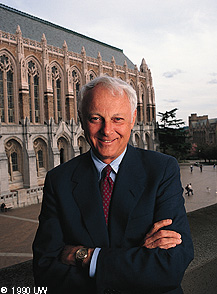
President William P. Gerberding stands on the balcony of Kane Hall with Suzzallo Library in the background. Photo by Davis Freeman.
Gerberding Attached to Premier University
Dr. William P. Gerberding, who this summer will become the 27th president of the University of Washington, said his decision to accept the post was influenced by UW’s status as one of the “premier universities in the country”: and by the Puget Sound area, which he termed a “progressive and successful part of the world.” Now chancellor at the University of Illinois at Champaign-Urbana, Gerberding has risen fast and far in the field of university administration … His selection from among more than 300 nominees ended an 11-month search for the successor to Dr. John Hogness, who will return to the School of Medicine, his “first love” after more than five years a president. “Dr. Gerberding has a very good reputation around the country,” said Dr. Hogness. “I think he’s going to be a superb president.” Spring 1979
Bullitt Chair Endowed
A recent gift of 20,00 shares of KING Broadcasting stock will be used to establish the first fully endowed chair in University of Washington history. The stock, a contribution from Dorothy Stimson Bullitt and the Bullitt Foundation, is valued at $1 million. … To be known as the Bullitt Chair of American History, the position will be filled by a distinguished and creative scholar who will emphasize undergraduate teaching. spring 1980
1980s
Hippies Out, Would-Be Yuppies In
“How different we must seem compared to the students of a decade ago. The anti-establishment sentiments of that era have been replaced by one preoccupying issue: not world unrest, not the rise of political conservatism in America, not draft registration, no even saving the whale—but the ominous prospect of finding a job. Students today are more interested in joining the establishment than in fighting it.”—Linda Danico, ’81, Spring 1981
Students Attack Pro-Iran Demonstrators
“The last sizable demonstration I recall was in the fall of 1979, shortly after the American embassy was taken in Iran. Droves of students vented their anger on a handful of Iranian students who were defending the actions of their countrymen. Even I, normally reserved and a bit too inhibited to chant slogans before an `Eyewitness News’ team, was swept up by the crowd that swarmed across the HUB lawn that day. Sadly, our emotions overpowered our sense, and the crowd attacked an Iranian student. He had to be rescued by police.”—Linda Danico, ’81, Spring 1981
The Wave Is Born
The old maestro Robb Weller, who raised cheerleading to a fine art in the early `70s, was back and the fans loved it. By fourth quarter he had orchestrated the entire stadium from his post in front of the student section—and the Dogs obliged with a victory over Stanford. Well, now a successful talk-show host on Chicago TV, told the crowd: “I haven’t had this much fun in nine years—sine the last time I was here!” Winter 1981-82
Konick on Teaching Students in the 1980s
“The write well and are great to have in class. Of course, there are differences. I never had to explain Dostoevsky’s political radicalism to my classes in the ’60s—they understood all that. And now, many of my brightest students are in computer science and business, rather than in the humanities.”—Professor Willis Konick, Fall 1982
Costigan Castigates Nationalism
“The contemporary wars between Iraq and Iran, between Israel and the Arabs, between Argentina and Britain, show how powerful is the force of an irrational nationalism equipped with the most modern weapons of destruction. In the nuclear age, humanity must learn that, to survive, some limits must be placed on claims of national sovereignty, some curbs on the expression of national ambitions. An unbridled nationalism has proved stronger than either Christianity or Communism, Islam or Buddhism, and dominates both democratic and totalitarian societies. The chances of controlling such nationalism seems remote. Yet the alternative is the destruction of civilization on this planet.”—Professor Giovanni Costigan, Fall 1982
Department Cuts Cause a Stir
The UW created a stir last fall when it announced that it would review 29 academic degree programs for elimination. Some suggested that the University intended to modify its traditional role as an undergraduate-oriented university with broad-based programs in the arts and sciences. Provost George Beckmann … says that although the institution is experiencing some slight enrollment shifts, it remains and will remain one of the strongest liberal arts and sciences institutions of its size in the country. … The enrollment shifts expected to occur at the UW over the next five or six years will not alter the character of this institution, Beckmann said. Engineering is expected to gain about 400 students and business about 125, insignificant numbers when compared to the more than 34,000 students who attend the University. Spring 1983 [In August 1983, following a $30-million cut in state support, the regents approved eliminating 24 degree programs, including art education, child drama, kinesiology, nutritional sciences and textiles, social management of technology, and outdoor recreation.]
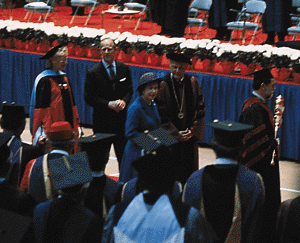
Queen Elizabeth II and President William P. Gerberding greet the crowd as they walk down the aisle at Hec Edmundson Pavilion. File photo.
Queen Goes to the Dawgs
Not since President John F. Kennedy visited campus for the University centennial … had the UW experienced such excitement and splendor. The cause was a convocation honoring Her Majesty the Queen Elizabeth II. … More than 500 faculty, dressed in the vivid robes of their alma maters, began the convocation with an academic procession. … In her speech, Queen Elizabeth mentioned the enduring ties between Great Britain and the Northwest, notably in trade, culture and education. She drew laughter when she reminded the audience that more than a century ago the U.S. and Great Britain almost went to war over the shooting of a stray pig in the San Juan Islands. Spring 1983
Coach’s Goal: Develop Values to Find What’s Important in Life
“I think coaching is viewed differently now than when I was young. Then it was like being a minister or a doctor—you were a teacher first. The bottom line was different. People were measured by their contribution to the kids in school. Coaches were looked at more from an educational standpoint than an entertainment standpoint, as they are now. … Wins are a by-product of coaching, but the product, hopefully, is that you’re going to improve the people you’ve been working with. Whether you’re teaching chemistry, physical education or basketball, the goal is to improve everybody’s skill level. You want to improve them as individuals so they might fit a little better into society. You want to help them develop a value system so they’ll have a recognition of what’s important in life.” —Basketball Coach Marv Harshman. Winter 1984-85
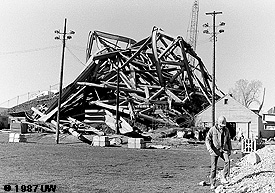
The framework of the North Stands Addition to Husky Stadium sits in a heap after it collapsed on Feb. 25, 1987. Photo by Brian Hanser.
Stadium Framework Collapses
Construction of the north stands addition to Husky Stadium continues following the February collapse of the new upper deck foundation. At press time the facility management office was unable to give an estimated completion date. Officials remain hopeful it will be in use by autumn. [There was no design error of the North Stands Addition. Investigators found that several critical guy wires—cables which kept the structure from twisting—were removed in error. The stadium opened as scheduled Sept. 5, 1987, in a game against Stanford.] Spring 1987
Branching Out: Process Begins for New Campuses
The whole character of the UW as a single-campus institution may well be changing by the early 1990s. In an historic action, the state Higher Education Coordinating Board has chosen the UW as the state institution responsible fore planning and implementing the expansion of higher education in the Puget Sound region Winter 1988 * UW upper-division and graduate centers in Tacoma and Bothell could begin operation by 1990. By 1995, UW Tacoma would serve 2,900 undergraduate students and UW Bothell would have 2,350 undergraduates; each campus would also serve 535 graduate students. Fall 1988
Congress Will Continue to `Investigate’ White House
“While Republicans maintained control of the White House, the Democrats strengthened their hold on Congress, an unusual development. Polling evidence suggests that the American people now like such a distribution of power. They are not willing to entrust full control of Washington to any one party. They wish each to be strong enough to watch the other and do so effectively. They believe that Johnson betrayed them in 1964, Nixon did so after 1972, and they have doubts about Bush as well as about Dukakis and the Democrats. Thus, congressional investigations of the executive branch seems certain to remain an important part of our political process.”—Professor Richard Kirkendall, Winter 1988-89
Tianamen Square: Chinese Students Afraid to Go Home
While students may not be jailed if they return to China, the Chinese government might place them in secluded, undeveloped areas where they will never be heard from again. “To intellectuals,” said Fengming Liu, president of the UW Association of Chinese Students, “this is the scariest thing of all.” Students fear for the safety of their families in China if they don’t return; they fear for their own safety and future if they do. The Chinese government has promised not to prosecute returning students. “But, said Liu, “the government also said, `We won’t use a gun against the students (in Tianamen Square).’ ” Autumn 1989
1990s
 The Name Game
The Name Game
Leaders of the association and the alumni magazine advisory committee felt … now might be a good time to consider a new name for The Washington Alumnus. “There is nothing unique about either `Washington’ or `Alumnus,'” noted Jack Ehrig, ’52. … On the other hand, our original columns are unique to the University of Washington, he said. Nobody else has such a name for an alumni magazine. Since the beginning, our columns have been identified with the UW and are part of the University’s official seal. “They are a great tradition. We have not made enough out of them,” he said. December 1989
The Fall of Communism
International Studies Professor Herbert Ellison becomes dramatic when he discusses the changes in the Communist world: “I think it is a revolution.” The changes are so immense and so shattering that he compares it to a watershed in modern history — the French Revolution. … “That system, for the first time since the Russian Revolution, is being systematically transformed — culturally, politically, economically, socially — the whole lot. That, in my book, is a revolution.” However, Ellison questions the theory of some commentators, such as Zbigniew Brzezinski, that this is the death of Communism. “I find it a more dynamic and creative process than that,” he says. “You wouldn’t title the French Revolution ‘The End of France’ or even ‘The End of Monarchy.’ ” … During the transition Ellison does see the danger of “a slow drift into anarchy—eventually you might get chaos. A lot of people are worried about that possibility.”… He warns that the transition is enormously difficult, but that the Soviet Union has a tremendous future potential. “It has one of the largest educated populations of any country, enormous natural resources and a great cultural tradition. It has all sorts of things going for it. It’s just that the transition period is very spooky for me.” March 1990
Goal Post Melee Shocks Campus
A University committee appointed by President William P. Gerberding continues to investigate a melee that occurred after the Nov. 18 Apple Cup victory over WSU, where fans clashed with police defending the football goal posts. Fans trying to tear down the west goal posts battled with police in riot gear, who used chemical Mace to control the crowd. Two fans were arrested and several were treated for injuries. Eventually the fans succeeded in removing the goal posts and dumped them in Lake Washington. Student leaders criticized the police action after the incident, with ASUW Vice President Casey Jorgensen stating, “The police went too far; it was a huge overreaction. It’s obvious the police weren’t in control of the situation.” University Police Chief Michael Shanahan stated that force was used for crowd control, not to defend property. Officers were instructed to keep fans off the field and away from the goal posts to prevent a stampede where people might be trampled or injured by falling posts. Shanahan said incidents at previous Apple Cup contests at Martin Stadium in Pullman prompted the UW concern for safety. March 1990
President Gerberding on Amateur Sports
“At least in the high-pressure, high-intensity revenue sports where these people really have precious little time for anything other than whatever studying they can do and their sport, I think we should be paying them a monthly stipend of $75 or whatever it is so that they can make ends meet. The only ones who can make ends meet now are the ones who have support from their parents. So I tried to put that in some context, too. I said, ‘Who are most of these young athletes who can’t make ends meet?’ A disproportionate number of them are black. And here’s this big white establishment, the NCAA, telling us that we can’t. If a kid’s mother dies, you can’t send him home. If they need a hamburger, they can’t afford it. It’s too strict the way it is now. Whatever the rules are, they should be abided by, but the rules right now are too strict. And to say, ‘Ah, but then they’re no longer amateurs’—they’re semi-pros right now. They’re being paid. They’re having their tuition taken care of, their books, their meals. They’re semi-professionals right now. Why not admit that, and give them a proper income for that?”—President William P. Gerberding, June 1990
Blaming the Victim
“Loggers are characterized as primitive, overweight, beer-drinking, not-so-intelligent laborers with little regard for the future. Such stereotyping is a classic form of blaming the victim. It dehumanizes people and justifies actions to remove them from their jobs and the land. After all, they are considered ‘bad people’ who deserve to suffer.”—Forest Resources Professor Robert Lee, December 1990
Tacoma, Bothell Campuses Open Doors for First Time
Two University of Washington branch campuses took giant steps this fall as classes opened in temporary quarters and the UW Board of Regents recommended permanent sites. In Tacoma, 187 students attended classes during the first quarter. In Bothell, 131 students began their junior and senior level classes. … During meetings in September and October, the regents recommended a downtown Tacoma site for the UW’s south branch campus and a site at the intersection of Highways 522 and 9 in Bothell for a north branch campus. December 1990
Crisis in the Gulf
“The primary reason that the U.S. is in that area … is to ensure the relative free flow, at a relative stable price, of an absolutely essential element in the world economic system—oil. The great fear on the part of the Administration and many Europeans and some others is that Saddam Hussein’s conquest will put him in a position to dictate world oil prices and their supply. …We have a president and coterie of people around him whose goal is to eliminate Saddam Hussein and—I have nothing positive to say about Saddam Hussein—but I think that the goal of the American foreign policy at this moment is not the restoration of some governmental system to Kuwait. I think it is a larger goal and since it is a larger goal which includes the elimination of Saddam Hussein, I’m not sure what room there is for negotiation on the American side, and I could understand why Saddam Hussein would not perceive any room for negotiation on his side.”—International Studies Professor Jere Bacharach after the Iraqi invasion of Kuwait. December 1990
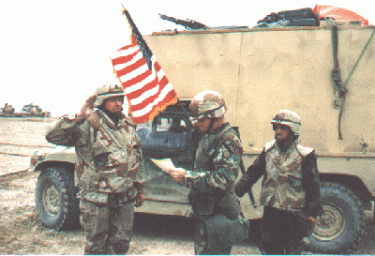
An American soldier salutes his superior during Operation Desert Storm.
Euphoria over Gulf Victory Will be Short-Lived
“The history of euphoria is that it never lasts” says American History Professor William Rorabaugh. “As complications unfold over the next six months to a year, and because we are involved in a major way now, there are going to be questions about our involvement. What that will do is kill the euphoria. Questions always kill the euphoria. … Bush has no where to go but down now, though he might coast pretty high for a while.” The American economy will pull down Bush’s rating, he adds. Citing the budget deficit and a shaky financial system, Rorabaugh says, “It just doesn’t look like the ’90s are going to be an economically viable decade.” June 1991
A Younger Writer Would ‘Bounce Off the Walls’
“I couldn’t have handled all this in my 30s. Well, maybe it would have been okay if I’d won it in my 30s, but not in my 20s. I was too young in my 20s. Winning an award like this and being sought for interviews and endorsements would send a younger writer bouncing off the walls. I’ve been publishing since 1965. For 20 years I have been self-generating. I’ve learned to get my work done without external recognition. If I had won the award earlier in my career, I may not have leaned how to do that.”—Creative Writing Professor Charles Johnson on winning the 1990 National Book Award. June 1991
Professor Challenges Repressed Memory
Psychology Professor Elizabeth Loftus characterizes the return of repressed memories of long-ago sexual abuse as potentially the “topic of the decade.” In recent months she has received a flood of letters from elderly women whose children have accused them, their husbands or other relatives of sexual abuse that occurred perhaps decades earlier. “What’s springing up all over the country are these civil sex abuse cases being brought by people suing their parents, their relatives, their friends, their teachers, their schools, their churches claiming they were abused 35 years ago,” she observes. “Imagine you’re a defendant trying to defend one of these cases? … We’ve all had the experience of remembering something, but does it mean that these memories … have some special license or characteristic of reliability? No. … There’s been virtually no good scientific work to document either the special reliability of it or the special unreliability of it.” Psychological theory points toward unreliability because of the elapsed time since the event occurred and the “many many intervening events,” she says. September 1991

Molecular Biotechnology Chair Leroy Hood came to the UW from CalTech, thanks to a $12 million gift from Microsoft CEO William Gates III. Photo by Davis Freeman.
Gates Gift Starts New UW Department
Microsoft Chairman and CEO William Gates III will give the University of Washington $12 million to establish a new Department of Molecular Biotechnology in the School of Medicine, President William P. Gerberding announced Oct. 7. The gift is the largest single commitment from an individual to the UW. Professor Leroy Hood will leave the California Institute of Technology to head the new molecular biotechnology department, believed to be the first department of its kind in the country. December 1991
Aid to Russia? Like Flushing Cash Down a Toilet
History Professor Donald Treadgold opposes a sudden “Marshall Plan” that would pump hundreds of millions of dollars into the current economy. “The Marshall Plan worked in post-war Western Europe because there was an institutional structure and experience under capitalism. It enabled them to rescue economies based on free enterprise. What we have in the Soviet Union is not the same at all. I find the Marshall Plan analogy not helpful and, in fact, confusing. It is based on the illusion that money will solve all the problems in the world. You just can’t do that to an economy in the shape of that of the Soviet Union. You might as well stand in front of a toilet and flush the currency down.” Massive economic aid should only be give when there is some structural movement. Treadgold would like to see extensive privatization of industry and collective farms, financial reform and currency reform. “It is going to be a slow, difficult, very painful process. And it is going to take a long time.” December 1991
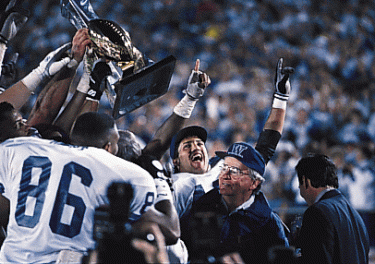
Coach Don James and players celebrate after winning the 1992 Rose Bowl. Photo by Irene Fertik.
Reaching the Top: Team Ranked Number One
It was a season of superlatives. For the first time since 1915 and the era of ‘Gil’ Dobie, the Washington football team went undefeated, posting a flawless 12-0 record. The 1991 Huskies were the first Pac-10 team to have a perfect season since the 1972 USC Trojans. When the Huskies beat Michigan 34-14, it was the first time since 1983-84 that a team had won back-to-back Rose Bowls. And when the USA Today/CNN Coaches Poll ranked Washington Number One, it was the first time a UW team has ever won an NCAA national championship. March 1992
UW’s First Campaign Ends with Success
The five-year campaign concluded on June 30 with $284 million in gifts and pledges, more than $34 million over its $250 million goal. … “The recruitment of Lee Hood will stay in people’s minds as a symbol of the Campaign for Washington,” says Vice President for Development Marilyn Dunn, “but that is only one of many good things that are happening here because of the campaign.” Although the campaign’s achievements are most readily expressed in terms of the money raised or the things those dollars accomplish, Dunn says, other important results of the campaign can’t be expressed in dollars. “The campaign brought the University closer to thousands of its alumni and friends,” says Dunn. “That was a very important part of our goal, and we are delighted with the results.” September 1992
Frat Row Brawl Prompts Inquiry
A 16-member task force of students, alumni, police officials, faculty and administrators met this fall to examine alcohol, behavioral and organizational issues associated with the independent Greek system that operates just off the UW campus. The task force was appointed by President William P. Gerberding after a tragic incident on Greek Row in which a woman lost the use of one eye. Jennifer Wen, a sophomore from Yakima, was struck in the eye with a beer bottle on Sept. 27 during a confrontation between students and members of the Phi Delta Theta fraternity, according to police reports. In addition to its review of alcohol use and abuse, “including unacceptable and even dangerous behavior,” the task force will consider “what the relationship between the University and its independent fraternity and sorority houses should be.” December 1992
Debating the Human Genome Project
The Human Genome Project has created a philosophical chasm. … Ethicists have raised all kinds of troubling issues. The ultimate fear is of attempts to engineer the DNA in human sperm and egg cells to create a “superhuman.” Detractors cite a long history of discrimination based on eugenics, a discredited scientific discipline that flourished in the U.S. and England during the early 20th century and inspired many of the Nazi race laws. Many people fear eugenics is resurfacing in attempts to link criminality and violence to genetic flaws. Despite fear about the manipulation of germ cell DNA, most molecular biologists believe that level of genetic tinkering will be impossible until the middle of the 21st century. But many people still worry about less technologically challenging efforts to purge “disease genes” and “undesirable traits” from the gene pool. The most troubling issue is that the genome initiative will let individuals glimpse their future before it’s possible to do much about it, says UW Medical History and Ethics Chair Albert Jonsen. December 1992
Football Scandal Breaks
Provost Laurel Wilkening appointed attorney Michael Glazier as a special state assistant attorney general Dec. 15 to investigate allegations of rules infractions in the University of Washington football program. The special counsel was named after a series of allegations against the UW football program broke Nov. 3 with a Seattle Times article detailing a $50,000 loan to Quarterback Billy Joe Hobert. … On Dec. 9 the Los Angeles Times broke a story alleging UW boosters engaged in a long-standing practice of providing Husky football players with thousands of dollars and other benefits that violate NCAA regulations, including summer jobs that required little or no work. … “I could have 98 percent of the players testify that everything was OK, but you’re always going to have 2 percent who are unhappy. … I personally would not care if the CIA or FBI came in and wanted to investigate our program. I have a clear conscience.”—Coach Don James. March 1993
Greeks Under Scrutiny
“There are a few houses who have made it nearly a career to inflict themselves on the community,” says Capt. Doug Dills of Seattle’s North Precinct. One fraternity is so troublesome that Seattle police have gathered evidence to support closing it under Seattle’s public nuisance abatement law. … Complaints to police usually focus on excessive noise, destruction of landscaping, fighting, public display of firearms, or urinating in neighboring yards. “The list goes on ad nauseam,” Dills says. Neighbors of the Greek system also mention speeding, drunken driving, hit and run driving, and the use of sling shots made from surgical tubing. … Police, neighbors, UW officials and the students themselves agree that alcohol is a big part of the problem. But excessive drinking also abounds in dormitories and student-occupied private apartments, notes UW student Chris Sherwin, the 1993-94 Interfraternity Council president. “It’s a society-wide thing. We get singled out because we’re a lovely media target,” Sherwin says. June 1993
Good-bye to All That
“Yesterday, this conference elected to add on a second year of bowl bans. However, they will continue to allow us to play on television so that they can reap monetary benefits, as they have been doing because of the outstanding play of our Huskies for many years. I have decided that I can no longer coach in a conference that treats its members, its coaches and their players so unfairly. Therefore, effective immediately, I am retiring as head coach of the Washington Huskies.”—Coach Don James, December 1993
More Departmental Cuts Coming?
To meet $12 million in state-mandated budget cuts, the UW must consider closing the School of Communications and the applied math, Slavic languages and literature, and speech communications departments, President Gerberding announced Nov. 30. In addition, degree programs in fiber arts, systematic musicology and radiological sciences are under review, as is the Institute of Environmental Studies. March 1995 * President William P. Gerberding rejected plans to cut the applied math and Slavic languages and literature departments, but he approved terminating the Institute for Environmental Studies, the President announced June 28. … The School of Communications will lose its programs in advertising, public relations and broadcast journalism. … Speech communications—once tagged for possible elimination—will lose some positions. Degree programs in systematic musicology and radiological sciences have already been cut. The UW has already closed some library branches, consolidated nursing programs, canceled a UW public service TV program and cut more than 40 support staff positions. Since 1992 the UW has had to absorb cuts roughly equal to 10 percent of its state-funded budget. September 1995
Reflections from Above: President Gerberding Looks Back
“I think the fact that the University got through the very difficult times in the 1980s in reasonably good shape is something that I’m most proud of. I’m hoping to be able to do it one more time because we’ve reached the same level of crisis this time around. But this is a more fractious situation, and I’m not sure we’ll be able to pull it off with as little damage as we did in the ’80s. I’m proud of the increased emphasis on undergraduate education that we have pushed very hard for the last seven or eight years. Certainly the capital budget has been magnificent and I had something to do with persuading the Legislature to provide those funds. This campus is going to be more urban and more compacted because of all these new science and technology buildings. But its beauty will not be attenuated because we’ve been very careful to ensure that the extraordinary beauty of this campus is maintained and, in many ways, even enhanced. So I’m proud both of the buildings and of the aesthetic, architectural dimension. I suppose the thing I’m most likely to be remembered for is the increase in private support, which has been quite dramatic and which we’ve worked hard at. I think it was an essential new aspect of the University’s life.”—President William P. Gerberding interviewed prior to his retirement after 16 years as the UW’s leader. March 1995
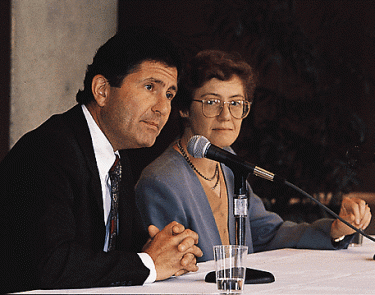
President Richard L. McCormick and his wife, History Professor Suzanne Lebsock, answer questions at a press conference shortly after he accepted the presidency at the University. Photo by Mary Levin.
New President Looks Forward
[Richard McCormick on getting into the UW] “If access means increasing enrollments at the UW, we’re going to have to think hard about how to do that and be responsive to the need. I believe higher education is a ticket for professional prosperity, economic well-being and even personal happiness. We have a responsibility to provide opportunities that come from higher education.” * [On critics of higher education] “We have to listen hard to what they say and then take a look at our own institution and how we can improve it. The concern for accountability is not going to go away. I see many needs that are straining the public coffers. Higher education is in competition for scare dollars. But that doesn’t mean we have to do everything our critics tell us to do.” September 1995
Birth of the Web: UW Launches Home Page in 1995
UW students are not the only group who can cruise through computer information sources, such as the World Wide Web. UW alumni now have a host of services at their fingertips—including an on-line version of Columns magazine that has more to it than the printed version. If you already have a computer account and can use web “browsers” such as Netscape or Mosaic, you are ready to “surf” the UW’s space on the Internet. Begin with the University of Washington Home Page, which has an “almost live” picture of Suzzallo Library, Rainier Vista and “Red Square.” The web address is http://www.washington.edu. December 1995
The Decline and Fall of the Ave
University Way NE today sadly bears little resemblance to its old self. Once a thriving business corridor, … now the Ave. is dominated by fast-food joints, used book shops, penny stores, copy shops and the like. Empty storefronts are as common as the skateboarding street kids and homeless people who clog the oh-so-narrow sidewalks, begging for money and just hanging out. “Nice people are gone; it’s like a jungle on the Avenue,” says Warren Porter, owner of Porter-Jensen Jewelers. December 1995
Preparing for the Baby Boom Echo
Currently a resident high school senior with about 1,000 combined SAT score and a 3.5 grade point average (GPA) is admissible, says UW Admissions Director W.W. “Tim” Washburn. If nothing is done to increase access, in just 10 years that same student with the same SAT score would have to have a 3.75 GPA to get in. Under this scenario, “The UW would become more elitist, perhaps less diverse, and certainly more distant from the aspirations of the great majority of the citizens of the state,” says President McCormick. … But many state citizens are unaware of the coming wave, according to a poll taken last summer for the state Higher Education Coordinating (HEC) Board. About 90 percent believed their children would be able to enroll in state universities and colleges in the future. Pollster Stuart Elway said that perception is “pretty far out of whack.” Currently there is room for only about half of all high school seniors. If nothing is done, by the year 2010 there will only be room for one-third of that year’s high school graduates. March 1996
Mistrust of Politics `Just a Phase’
Former Gov. Dan Evans, who served on both the state and federal levels, believes this age of mistrust is just a phase. “It is the cyclical nature of government and people’s beliefs,” he says. “The image of government will indeed change once more and more people realize the thinness of, and the distortion of, the way news is reported. There will be a shift in the way it is reported, and people will listen. The same goes for political campaigning. If someone runs a positive campaign and wins, people will say that is the way to go. We will never see a time when government is viewed as an enormous good by everyone. There will always be skepticism. And that’s good. But we won’t always have the extraordinary distrust of today.” June 1996
Watching the Market
“I have no confidence in predicting anything,” says Finance Professor V. Vance Roley. “I used to think you might be able to predict long-term rates, but the market is so efficient nowadays, it immediately takes those factors into account.” He says investors need to look at two overall factors: the inflation rate and the performance of the economy. “If inflation increases, the Federal Reserve is going to tighten quickly. And if the economy looks very strong, the Fed is going to tighten.” … He feels the board has done pretty well with the economy—even during a Presidential election year. “The Fed has ignored the political pressures and pretty much does the right thing,” he says. “They are pretty well insulated. After all, their terms are for 14 years. Of course, they are a creation of Congress and lawmakers could always dissolve the Fed—but they won’t. It would cause too much of a panic.” September 1996
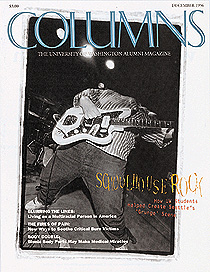
Grunge rocker Tad Doyle was on the cover of the December 1996 Columns, which covered the rise of the Seattle music scene on the UW campus.
The Birth of `Grunge’ Rock
This particular version of garage punk was a hometown brew created by bands from the Northwest, some of the musicians even went to the UW. Though locals hated the name—since it only described about one-tenth of the local bands at the time—out-of-town critics dubbed it “grunge.” The term stuck, and what was simply a happenstance confluence of many divergent talents became a movement. On local independent labels like Sub Pop and C/Z, it was a sound that first took over the “U” District, the Rainbow Tavern, the HUB Ballroom, and eventually conquered the Wal-Mart. And it even took over Terry Hall. December 1996
Freshman Class Breaks Record
The UW expects 4,400 freshmen this fall, breaking the record of 4,373 set in 1965. … Signs of the “baby boom echo” are beginning to hit the campus. The Class of 2001 will be about 300 students larger than last year’s class…. More freshmen went through summer orientation this year than ever before and the UW’s residence halls are at capacity for the first time in more than a decade.
The UW is opening living space that had been mothballed, such as the east wing of Mercer Hall, and is converting single rooms to doubles. “We’ve done everything we can. We’ve looked under every rock to find a place for a bed,” says Housing and Food Services Finance Director Nancy Hyde. She projects total capacity at 4,516 residents this fall, up from 4,165 last year. September 1997
UW Tacoma Dean Makes Predictions
Even though these are heady days for UWT, Dean Vicky Carwein is not shy about the future. By 2011, there could be 9,300 full-time students at the campus. In the next 25 years, Carwein sees the campus growing up the hill to fill its planned 46-acre site. One hundred years from now she see a campus of 20,000 students with dormitories and Ph.D. programs. “It will be a four-year institution with a statewide draw, a truly full-service university with some active research programs.” September 1997
Nobel Laureates on Predicting the Future
“There’s a stupid misconception that you should know everything about everything, just because you won the Nobel Prize in a given discipline,” says Biochemistry Professor Edmond Fischer. “The missionary spirit is just not my style.” … The winners were particularly bemused by continual demands to predict the future: “When they give you the Nobel Prize, they don’t hand out a crystal ball to go with it,” says Medicine and Oncology Professor E. Donnall Thomas. March 1998